#looking forward to seeing more of his personal motivations and character arc and skills
Explore tagged Tumblr posts
Text
Currently reading Ao Ashi for the first time. 100+ chapters in with no hint of stopping the binge and I can officially say that this is in my personal top 3 favorites in sports manga, alongside Eyeshield 21 and Baby Steps. It's got great art, thorough character development + interesting characters, and engaging matches that really gets you pumped!!!
#ao ashi#sports manga#lowkey hoping we dont draw out too long the whole thing with hana#like there's sort of a love triangle but no doubt mc likes her and only her + the thing with black haired girl was just used as a foil to#draw out hana's insecurity about not knowing shit about football#but like#hopefully she soon knows that mc just wants her genuine support#and if she feels insecure#she could just???research about it??? and ask questions???#and dive more into her path to becoming a doctor for athletes instead of just being constricted to the role of a pining girl with a crush#anyway just want this to be a quick arc and for hana to support mc and for mc to acknowledge her importance and for them to#support each other naturally like maruo-kun and nacchan in baby steps#and for hana (like nacchan) to strive towards her own personal goals#god i hope we dont do the annoying non-existent love triangle for too long#also hoping we soon go into otomo#so far we got focus placed on ppl like togashi and tachibana and stuff so it feels inevitable that we'll get to him soon#right?#god ive been waiting since tachibana's story was done#otomo's been here from nearly the start alongside mc#then he just kinda faded to the bg#looking forward to seeing more of his personal motivations and character arc and skills#also excited to get an arc on akutsu cuz i wanna know why he's such a fucking asshole haha
17 notes
·
View notes
Text
What's fascinating about Sampo is how contradictory he is.
He seems to draw so much attention to himself, not only in personality but in style, yet can disappear without a sound. Speaking of style, it's so unexpectedly morbid when you think about it. His shoulder pad (?) Looks like a lizard skull, whatever that thing is around his back looks like a spine, even his shirt (if it can really be called that) looks like a stylized ribcage. Heck his whole vibe based on design alone is different from his personality.
He's played up to be motivated by money, but it doesn't take much convincing to get him to do things for you without reward. And I've never seen him ask twice.
He completely avoids getting involved in battles, and it's obviously not due to lack of skill. He obviously knows his way around a blade, based on his knife tricks idle. If you look at his foot work on his normal attack it's perfectly balanced for each strike.
Everything about him is so himbo coded, but he canonacly knows more than he should (ex. Naming a different star system despite being presented as someone from a planet without space travel).
He says so little in so much. He's the character we know the least about despite being the first we meet in Belobog. The cutscene at the end of the Belobog arc seemed to imply that we'd see him again in the storyline and I'm really looking forward to that day.
223 notes
·
View notes
Text
WIP Wednesday: Custos Custodium
In which a dash of realism is applied to office culture in an investigative law enforcement agency. Jensen is a new agent with a high-profile case, after all, and people are going to want to be kept in the loop. Read all about his big break here.
Jensen suffered himself to be led away, down to Miller’s office, behind MacReady’s set and suited shoulders. Miller was typing away at his workstation, but he jerked his head at the chairs in front of his desk. His fingers hammered on the keyboard for a minute while they sat and waited, then he clicked aggressively and sat back with a sigh of relief. “And the other three hundred emails can at least wait until tomorrow. Christ, I hate this desk. Jensen.”
“Sir.”
“Sorry to drag you in here on a Friday afternoon, but it’s what I had. I need a status report on this Marchenko you’re hunting.”
Jensen shifted in his chair, feeling MacReady’s eyes boring into his temple. “No progress since we last spoke, sir. All the evidence points his way: Stanek’s confession, the emails I found… I just need to find him. He vanished from Golem right after Rucker’s death, and no one’s seen him since.”
“Any luck on that Swiss facility? Chang’s been helping you, right?”
MacReady leaned forward, scowling. “He’s been trying. The man’s obsessed—you can’t get him to work on anything else—but there’s nothing to show for it.”
“Thank you, Mac.” Miller raised an eyebrow at Jensen. “Is that so?”
“It is. He’s found traces, dead links, a suspicious pattern of scrubbed data, but it still only tells us that someone with a lot of resources wanted the place to be extremely well-hidden.”
Miller grimaced and ran his hands through his cropped grey hair. “Listen, Jensen, I can tell this isn’t a problem with your work ethic or your motivation or your investigative skills. Or your gut—you were right on the money with Marchenko, and you have the bomb-maker behind bars. But we need Marchenko in a cell, too. Before the Vote, so he can’t do whatever he’s planning next.”
“I know.” Jensen gritted his teeth. Miller couldn’t possibly be the mole, not with his integrity—and more, his consistency—of character. But that was how they got you, wasn’t it? “I’ve been cultivating contacts inside ARC. The one we used for Rucker is off-board, but his brother and his sister-in-law feel like they owe me. They put me in touch with a couple of people. I haven’t been able to leapfrog into Marchenko’s inner circle, though.”
“Do you need anything? Resources? Another set of hands? I don’t want you to feel like you can’t ask for help, and I’ll remind you that pride—arrogance—costs lives in this line of work.” His gaze flicked toward MacReady momentarily.
Jensen shook his head. He’d been thinking of little else himself for the past two weeks. “Someone even better than Chang. Another Aug working on infiltrating ARC. Other than that, I don’t know.”
“Maybe Argento could…” Miller trailed off. The three of them traded looks. “No, I can’t see it either. She belongs in the field, and she’s personable enough, but HUMINT will never be her forte.”
“You could send him back in,” MacReady said. “Into Golem for a look ’round. There’s got to be a computer he can sneak into for some answers.”
Jensen nodded reluctantly, but Miller frowned. “I hate the idea. Legally and logistically, it’s a fishing expedition, recon without intel. And it’s a huge risk.”
“I can handle myself, sir,” Jensen protested.
“Maybe. Probably. But if you’re discovered in there, the optics this close to the Vote… it shouldn’t be a consideration, God knows, but here we are.” Miller rapped the desktop. “Very well. Last resort. If you’ve gotten nothing by Monday, we’ll send you in to scout around. But I hope you get a break. Speaking of which, I’m grabbing a bite.”
They stood as he did. “Sounds good, sir,” Jensen said. “I’ll update you both with anything I learn.”
6 notes
·
View notes
Note
for the character ask, midoriya and shinsou !!
thanks anon!!! two of my fave little guys....
midoriya:
favorite thing about them
it's that determination & kindness combo...i talked about this recently but i think the exact moment when i fell in love with this character was the sports festival todoroki fight where he uses his goddamn mouth to angle his shots because he's already broken all his fingers and couldn't snap them anymore. like...christ. this is what happens when you dial compassion & determination & resourcefulness all the way up to the point where it breaks the scale, but forget to put any self-worth in.
i love him. he fights so so hard all the time, and he does it because he cares so much. even about people who didn't ask for it. even about people who have hurt him very badly. it's insane (positive) to me that his defining moved-without-thinking saving someone moment was to save the person who literally that day told him he'd be better off dead. kindness!! determination!! beyond all fucking reason. we don't deserve this boy
least favorite thing about them:
hmmm...i do sometimes wish he were given more space to be a little imperfect. get a little mad. a little tired. but then i'm still very far behind in this show and look forward eagerly to the yellow scarf era of sadness for maybe providing this content. and it leaves a great space for hurt/comfort fic!
so i guess maybe it's that i get secondhand embarrassment very easily so he does ping this sometimes. i.e. i had to mute the scene where they're practicing hero interview skills lmao
favorite line
hrrrrr i cannot pick one. i love when he says that being a hero means meddling in things even when you aren't asked to, during the stain arc. love my little meddler who is so full of compassion and can't leave anything alone.
i am still thinking about the sports festival todoroki fight and i absolutely adore when he's like you haven't even put a scratch on me yet! bc all his wounds are...self-inflicted. he's fucking insane. imagine, your weird little classmate breaks all his bones at you and then brags about you haven't hurt him at all yet. i love that he gets kind of mean in this fight bc he is genuinely mad! that he has fought so so hard for this and todoroki is hamstringing himself! while also again being deeply motivated by compassion.
and last one i promise but i love when he says he wants to be strong enough so that no one will have to worry about him anymore. again the compassion of it all but also the...weird backdooring his way around having an actual sense of self-worth. just like yeah it does seem to upset people when i injure myself and put myself in deadly situations :/ guess i'd better cut that out...
brotp
gestures again to the number of aizawa & midoriya fics i've written...but also this boy is an unstoppable friendship machine and i love his dynamics with eri, the whole dekusquad, all might, mirio...never too many friends for my little guy
OTP
shindeku....again i enjoy them equally as a platonic dynamic but ahhh. i crave for these two to understand and support eachother like nothing else.
i do also enjoy tododeku tho that one suffers a bit from fandom oversaturation for me
nOTP
sorry bakudeku enjoyers, you're valid but i can't engage with it
random headcanon
hmmm...i think after he gets into UA he doesn't have time to keep up with his normal fanboy activities anymore, hero forums and online analyst youtubers etc, but every so often he'll stay up way way too late and have a deep dive into all the stuff he's missed. and it's kind of a weird bittersweet nostalgia thing, bc that was such an unhappy time but this was the one thing that could always make him light up, and now he's always weeks behind on stuff that used to be his whole world, but also he's seeing news and analysis about heroes who are now his teachers and sometimes his colleagues. taking these moments to once again look at the world he's belonging to more and more every day from the outside...and then the next morning everyone is like goddamn midoriya you look like death, please sleep!!!
unpopular opinion
hmmmmm i fairly often see him written as swearing a lot in his own head or too quietly for anyone to hear, and i just don't see it. i think he's too polite even when no one is watching. i think he says one fuck per quarter and it's deeply, deeply, impactful and also a tiny part of his brain still worries his mom is disappointed in him every time
i also don't think he has physical scars from his bullying era for numerous reasons but this is already way too long to ramble about all of those
song i associate with them
many determination songs ping as izuku to me, a key one being i'm gonna win by rob cantor
favorite picture of them
this habken art, specifically his big beautiful smiles on the 2nd and 4th pages...i love he!!!
shinsou under the cut. sorry shinsou. i'm too verbose to live
shinsou:
favorite thing about them:
it's determination again but this time the bitter flavour of determination. i think he makes such a fun character foil to mido partly because there's this anger there that we never really see izuku express. i love that he does wild shit like openly challenging the entire hero course in a corridor, both because provoking people helps his quirk so he's smartly laying the groundwork, but also because he's mad!! he's been overlooked and maligned and passed over and he's angry.
and i love that the bitterness seems to ease a bit once someone takes a chance on him and once he sees that everyone else, even these chosen hero students, are working incredibly hard also. and then you just get that incredible determination - i love all the lines in the joint training arc when he talks about how he's not going to stop until he catches up.
least favorite thing
give my boy screentime...please, please, please. on the one hand it's important to his character that he was excluded from this space but also i would have killed for him in class A earlier. the shinsou content drought oppressed Me Personally
favorite line
"You can't help the things you long for."
it's just so...like how limitations can be really good for art, i think sometimes when you tell a story faster you tell it better. and this is just such a simple encapsulation of that thing both midoriya & shinsou go through where all they want is a place in this world that has decided they don't belong there. and whenever i think of it i see that little cherry blossom petal floating through the air...those couple of eps that establish shinsou as a character were just so fucking good
broTP
the aizawa mentorship and comparisons between young aizawa and shinsou is everything to me. also him with class A in general bc it's so cute to me how much they all immediately like him and want him to be their friend. it's what he deserves!!
OTP
once again gently cradling shindeku in my arms
nOTP
don't have one!
random headcanon
i see him as a big reader! like he's a serious studious little guy, there's that line in the light novels about how he basically studies all weekend, and i think reading is one of those hobbies where it kind of feels productive enough that he can let himself do something relaxing for once. and i can so easily see him as one of those kids reading under the covers way way too late. plus i think he would enjoy the escapism...idk why but he pings me as a sci-fi enjoyer specifically
unpopular opinion
hmmmm i don't know if i have one? shinsou enjoyers produce so many excellent varied shinsous. i do read him i think as a little more serious/less jokey and relaxed than a lot of fanon shinsous, but that's partly bc many of those i think were produced before joint training arc was a thing, and also it's contextual - in an environment where he feels accepted and has chilled out a bit i could see him as an absolute menace
song i associate with them
i have no shinsou songs!! if you do please give them to me
favorite picture of them
this art is so so beautiful to me...the expression, the flowers, the tattoo. canon suffers from horrible lack of shinsous, but there is so so much good shinsou art to bless us at least
10 notes
·
View notes
Text
Ted Lasso - Season 3 (2023) Review

Plot: In the 12-episode third season of Ted Lasso, the newly-promoted AFC Richmond faces ridicule as media predictions widely peg them as last in the Premier League and Nate, now hailed as the 'wonder kid,' has gone to work for Rupert at West Ham United.
Ted Lasso is such a unique show that no one expected to become as popular as it did. Heck, I’m sure Apple is trying every persuasive skill possible to motivate Jason Sudeikis to make more of it even though he’s been adamant that his show would only have a 3 season story-arc. The success of Ted Lasso shouldn’t come as a surprise though - it’s a show that is so refreshing in an otherwise outside world of hate. It’s hard not to look forward every week to a new episode filled with nuanced highs and lows. There is also an unrelentless charge of optimism, especially from the titular Ted, who only wants to see the good in everyone and is adamant in bringing out that good even in the worst of people. There can be an argument made that the first season of Ted Lasso is its best, as it’s simply dripping with that overwhelming feeling of positivity, with every moment feeling like you’re wrapped in a warm blanket surrounded by love and appreciation. The second and now third season go into more darker territories, however I personally think that the show doesn’t lose its charm in the process, as the message is still there that believing in Ted Lasso’s way will in the long run result in success and redemption for all. It’s literally the perfect feel-good show, and it’s a shame that this third season may be its last, but also as evident from the finale the ending is one that makes sense narratively, even though certain characters are left open to continue in their own spin-offs. I’m certain Apple is already writing up checks to make those spin-offs a reality.
So, season 3 of Ted Lasso - does it hold up to the rest of the show? Short answer is yes. And for the most part this final season lacks that sense of finality (minus the last two episodes), with a lot of the episodes simply continuing their focus on developing all the characters in the series. It was evident from the second season with Ted himself taking a backseat, allowing the other side characters to have their moment in the spotlight. The third season puts its focus on the likes of Billy Harris’ Colin Hughes struggling with his identity; James Lance’s Trent Crimm (no longer The Independent) joining Richmond to write a book about their journey in the Premier League; Juno Temple’s Keeley having her own business and her struggles along the way; and of course Nick Mohammed’s Nate ‘the Wonder Kid’ traitorous decision to join Anthony Head’s Rupert in West Ham as their coach, and the ramifications of that decision. Heck, even Charlie Hiscock’s Will the kitman gets more moments to shine, and he’s only the kitman. Yet as the legendary Zava says to Will “I too worked as a ball-boy once for a club when I was just 11 years old. Your passion is why I play.” That reminds me - we have to talk about Zava!!
Let’s talk about Zava! So prior to this season the main narcissist of the Richmond team was the self-obsessed goal scorer Jamie Tartt (played by Phil Dunster). However through the show his character evolved and now has become a proper team-player that puts others before himself, however that means Richmond needed another self-absorbed player to fill that empty void. In cometh the one and only man, the myth, the legend John Wick.....errr...I mean, Zava (played by Maximilian Osinski)! Yes, that is his name. Known mononymously as Zava, this fictional football legend brings arrogance and swagger to the team. Upon his transfer and entrance to Richmond’s locker room, other team players are stuck starstruck as he carves out his own meditative space and shrine to himself in one corner of the room. Evidently the character of Zava is inspired by the Swedish striker Zlatan Ibrahimovic, who is one of the most successful footballers of all time and his renowned for his inspirational quotes and attitude. Zava even shares the same hair-style with Zlatan with the pulled back slick man bun. Zava essentially is showcased as the God of football, and Osinski plays him as such, and look - everything with Zava is great! And luckily the writers don’t overuse him, he’s only in a couple of episodes but my oh my does Zava leave an impression! The one and only Zava!!
All the colourful cast return, with Sudeikis’ likeable moustachioed titular Ted a constant delight who you want to hug all the time; Hannah Waddingham (now a Eurovision presenter star) brightens the screen with her energy; Brett Goldstein’s Roy Kent provides his signature grunts throughout, and there’s a great ongoing gag this season with him screaming “whistle”. Anthony Head is devilishly evil as Rupert, and we get to see his home office that looks like the lair of Emperor Palpatine from Star Wars (which I guess makes Nate Darth Vader??). Brendan Hunt’s Coach Beard is an icon at this point, and Jeremy Swift, Cristo Fernandez and Kola Bokinni round up the colourful cast.
If you loved the previous seasons you’ll enjoy the third season of Ted Lasso. It has the same charm and DNA of the previous episodes, and is a pure delight to watch, even during the darker moments as you know that in the end everything will be set straight. Even with Nate turning into the villain - we already know he’s going to have a redemptive arc, this is Ted Lasso overall. It’s about the journey and how he gets through that redemptive arc, and look, by the end of the show you as an audience may not have forgiven Nate, and most people wouldn’t. But sure as hell Ted and his crew do. So it is indeed with great sorrow we say goodbye to Ted Lasso, at least for the time being, and we shall miss all these characters we have grown to love over these past few years. It’s a bittersweet finale, but as Trent Crimm, The Independent stated back in season 1 - “If the Lasso way is wrong, it’s hard to imagine being right.”
Overall score: 8/10

#ted lasso#ted lasso season 3#jason sudeikis#hannah waddingham#brett goldstein#juno temple#nick mohammed#maximilian osinski#ted lasso zava#ted lasso review#football is life#ted lasso season 3 review#football#comedy#drama#apple#apple tv#apple tv+#tv show#2023#2023 in tv#phil dunster#brendan hunt#anthony head#james lance#jeremy swift#cristo fernández#toheeb jimoh#billy harris#streaming
4 notes
·
View notes
Note
Hey raven, do you think in future stories we may see more angst or at least back story with Kalim? I know he's our resident sunshine character but beyond being somewhat naive, with all the assassinations and other potential tragedies throughout his life, I wouldn't be surprised if we found out kalim's constant happiness was his own way of coping with it.
But I may be wrong, what are your thoughts or Headcannons about future development with Kalim?

Before the release of chapter 4, a popular fan theory floating around was that Kalim has a secret evil side, but now we can see he's just ashldbbasiydbaiodbsa sunshine lad 😂 Now I believe it's a popular belief that Kalim's happiness is how he deals with the constant assassination attempts, but I also think part of it is that's just how Kalim's personality is. Having grown up extremely privileged, he can afford to live and spend carefreely, and that plays into how he developed his coping methods.
***Main story spoilers below the cut!***
I think a good route for character development for Kalim would be centered around him recognizing that that not everyone is able to live as lavishly as he does (maybe even spurring him to be motivated to do charity work beyond just donating money; really getting up in there and roughing it with his own hands). He kind of got a start with that in chapter 4 when Jamil reveals how unhappy he is having to constantly cater to Kalim and the Asims. There's a divide between the working class and the wealthy, and Kalim should be more cognizant of it if he wishes to reconcile properly with Jamil.
I personally want to see more interactions between him and Ruggie, who comes from the other extreme end of the social ladder. Leona, another rich character, once commented that he thought Ruggie's home was a doghouse when he first saw it because it looked so unkempt and worn down. It's definitely a far cry from the palace he's used to lounging around in. However, I think that Kalim has more capacity to empathize with Ruggie's situation compared to Leona, and seeing just how "the other half" lives can be a valuable experience for Kalim and his growth.
As he learns more about the world, it would also be cool to see Kalim actually learn how to be independent. He relies far too much on Jamil for basic things like being reminded to wake up on time or to make his meals and can't seem to do those things himself (compared to Leona, who has Ruggie take care of him out of laziness). Kalim's also too impulsive with his desires and doesn't realize how much trouble he is making for those around him by acting mainly based on what he thinks is best or would be the most fun (like the time he dragged Idia, an extreme introvert, to a meal, or all the times he asked Jamil to organize banquets for him).
He is used to a certain lifestyle where he gets everything he wants and everyone acts as he wills them to, so Kalim just assumes "this is the norm, and this is how things will always be". This is the perfect set up for him to have that view challenged, questioned, and even shattered (as we see in chapter 5 when Kalim ends up not being picked as a lead performer). It propels Kalim to pick up the pace and push himself to try harder and actually apply himself instead of relying on others to fix his messes or lack of skill for him. That's along the lines of what I want to see for Kalim going forward.
So basically, chapter 4 started a character arc with Kalim, chapter 5 kind of continued it, and I like the direction it's going, but I think it could be explored in greater detail. I hope that in learning more about people outside of his mega wealthy bubble can expand Kalim's worldview, make him more sympathetic to the plights and the limited wallets of the common man, and how to look after himself.
#Kalim Al-Asim#Ruggie Bucchi#Leona Kingscholar#Idia Shroud#Jamil Viper#Scarabia#notes from the writing raven#spoilers
76 notes
·
View notes
Text
We spoke to Tom Hiddleston about Loki, PowerPoint presentations and the nature of free will
Despite a decade of playing Loki in several Marvel movies and now a TV show, Tom Hiddleston isn’t tired of the role. “There is always something new to be found,” he says The edge.
This week is the premiere of Loki on Disney Plus, a six-episode series that marks the character’s first lead role. It is a story of time travel and branched timelines as Loki is captured by an organization called the Time Variance Authority (TVA). It combines action, humor and some old-fashioned detective work, while tackling serious topics such as the nature of free will. There are also some new faces on board as Hiddleston is joined by Marvel newcomers Owen Wilson, who plays a TVA agent named Mobius, and director Kate Herron, best known for her work on the first season of Sex education.
Prior to the show’s premiere, I had the chance to talk to Hiddleston about his time as a character, a presentation that made him feel like an “amateur academic giving a thesis on Loki,” working with Wilson and Herron, and whether our lives are predetermined. Typical Marvel stuff.
The following interview has been edited and abbreviated for clarity.
We are now at a decade where you play Loki. How have your feelings about the character changed or grown over that time?
I’m honestly just thankful that I’m still here. I find that I am always surprised and happy that I get another chance in it. Long before I was cast, Loki was just the most fascinating and complex character with such depth and range, and he’s been in Marvel comics in several iterations for 60 years, and he’s been in our thoughts, in stories we tell as humans, for hundreds, if not thousands of years. I find that even though it has been 10 years, every time I come back, there is always more to discover. There is always more to dig because these impostors are kind of mercurial and shape-shifting. So there is always something new to be found.
"“Loki is out of control. He’s a man on the run.”"
Now that you’ve focused this six-episode series on Loki, what were you looking forward to exploring with this? What were you hoping to dive into?
I think he’s really opening up and bringing out his many different identities and facets. In my preparation to play the character, I’ve always seen him have so many different and seemingly contradictory characteristics. You think, “How can all these characteristics exist in one person, in one being?” And yet they do.
Loki has always been a character in all MCU movies that seems to be very controlled. He seems to know what cards he has in his hand and how he is going to play them. And Loki, in the TVA – this organization that rules time – has gotten out of hand. He’s a man on the run. And he is motivated by a desire to understand. Suddenly he discovers that there is all this information that he does not have, and he has to get his hands on it. And that actually gives the series great momentum. Loki is on the back foot, everyone knows more than him, and seeing how he adapts, seeing how he improvises after that – if improvisation is possible in the TVA. That’s a question we’re trying to raise, whether you have free will.
I read about the Loki school you led to prepare the team for the character’s history. How did you prepare for that? Did you actually know it all, or did you have to do a lot of research?
I wish it wouldn’t be 10 hours long. I knew I had to summarize what I found useful to tell the crew. It came about thanks to Kate Herron, our director who has done an extraordinary job on this whole series, and he thought maybe it would be a good idea to get everyone together because there were so many department heads, different crew members – production design, costume design, cinematography, camera, sound, stunts – and wanting to make sure everyone had the same information about Loki, and it might be helpful to listen to my experience. I was trying to explain how we constructed Loki’s arc across the six movies he’s in the MCU and figure out what was useful in that arc and what we could leave behind.
I suddenly felt extremely nervous, as if I were an amateur academic writing a thesis on Loki. You’ll have to ask the others if it was helpful at all. But at least we synchronized the watches and we started from the same place.
"“If I were tall enough to use PowerPoint, I could retire and become a full-time professor.”"
So is there a PowerPoint file out there somewhere that will leak out one day?
If I was highly skilled enough to use PowerPoint, I could retire and become a full-time professor.
I did have a few clips. I thought there were some clips from the movies that could be helpful. It was interesting, even though it was about how the costume had changed over the years and why. And when does Loki wear the horns? Are the horns a casual thing? Are they a ceremonial thing like a crown? Is it an extension of an inner intention? Do the horns come out if he’s particularly evil? Why is her hair different? Sometimes he wears a cape, sometimes not. Sometimes he uses magic, sometimes he uses his own body to fight in combat. All questions that people were curious about.
I know this was meant for the rest of the crew, but was it helpful for you to go through this again as you prepared to jump back into the role?
Oh yes, absolutely, just to refresh myself about certain decisions we had made and why certain things were changed… sometimes you try to bring very elaborate and beautifully illustrated comic book panels into a physical reality on a movie set and figure out how to merge these two worlds. It was interesting. I got some great questions about how he moves the way he does and where certain things showed up in stunts, especially hair, makeup and wardrobe, how the clothes changed and why we made those choices.
It was interesting to refresh myself on the extraordinary input, because I carry the inspiration of great people with me. [Thor director] Kenneth Branagh and Alexandra Byrne, our costume designer; Bo Welch who designed the first Thor movie; Charlie Wood who was production designer on The dark world; the whole crew of Ragnarok; Mayes Rubeo, the costume designer of Ragnarok; and people like Douglas Noe, who has been doing makeup on Loki for a long time. So there was a lot to unpack.
Both Kate Herron and Owen Wilson are newcomers to the Marvel machine. Is it helpful to have such an external perspective?
Absolutely. Both Kate and Owen came in with so many questions because they hadn’t lived in Loki’s head for 10 years. They have a fresh take on it. Kate was so well prepared and so well researched; she even brought in new Marvel Publishing material that I’d never seen before, about Loki’s inner world. Owen came in and asked me a lot of questions about my experience. I remember him saying, “Tom, why should I?” you do you like to play Loki?” And I found myself saying, “Well, he’s just got this whole range. He can play the light keys, but he can also play the heavy keys in the bass clef. And somehow the character has both.” And he loved that way of thinking about it, he said, “I think I could say that on the show.” And so it was really his very intelligent question that took us elsewhere in the story.
Given the themes of the first two episodes, I have to ask: do you believe in free will?
I hope so. Free will is such an interesting, eternal question. I think people have asked to what extent we have the power of self-determination, self-realization, choice about our actions and whether we can control the course of our lives. It goes back to evolutionary or psychological arguments about nature and nurture and why we are who we are. Maybe it’s the journey of a lifetime to find out, to really take the wheel of your own life. Because we are set on a path in childhood, I think, often by accident – the misfortune of birth, where we were born and when – and we are propelled in many ways by the unconscious.
That’s a complicated answer. It’s a complex question. So I hope so. I hope true free will is possible. But for all of us, I think it can be a long journey of self-discovery.
197 notes
·
View notes
Text
Daisuke and Tagiru
Ever since Tagiru’s concept was announced, people have been comparing him to Daisuke, and, honestly, it’s hard not to -- in fact, considering that Xros Wars did certainly have some degree of trying to invoke stuff from older series, it’s very likely this is intentional! You have someone introduced as a junior to a prior protagonist, who wears goggles like him (and eventually inherits the senior’s pair), wears blue, has a blue dragon-like partner, is more hot-headed than said senior...
...and that is about where the similarities stop!
Still, I think such prominent base profile details practically beg one to make a comparison, so let’s dig in!
(Translations linked below are PositronCannon’s for 02, The Wild Bunch for Hunters, and L Subs for a Kizuna screenshot, unless otherwise stated.)
The junior-senior relationship
Both Daisuke and Tagiru look up to their seniors, and that’s probably the most well-known part about both of them, but I think the first major difference between the two is how they approach that admiration towards said seniors.


While Daisuke’s way of approaching Taichi can generally be observed through his tone and actions overall, the most clear representation is in 02 episode 8, where you get to see their relationship as soccer team junior and senior. The most consistent thing about this is that Daisuke is completely and utterly deferential to Taichi.
What does this mean? It means that, even when Daisuke is jokingly bragging about his skills, it only takes one criticism from Taichi to entirely shut him down. The degree to which Daisuke respects Taichi’s opinion and holds him in regard is in such high esteem that he completely defers to his judgment. He really, really thinks Taichi is that much cooler of an experienced person whose judgment takes priority over his own. Even in episode 39, when he makes his first major disagreement against Taichi -- that he wants to go help Ken in Tamachi instead of accompanying the others -- the way he phrases it is firm, but politely and respectfully, to the point it almost comes off like he’s asking for permission to go.
Tagiru, on the other hand...
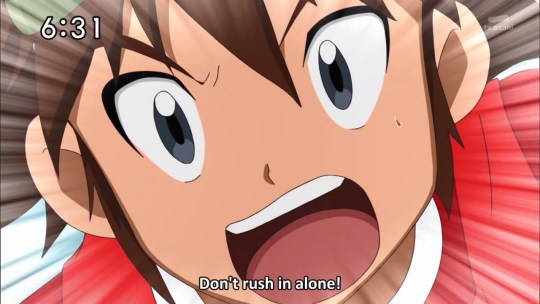

...well, his first appearance in the series involves disregarding Taiki’s advice. And when it comes to his approach to Taiki...

...his goal is to outdo Taiki. He understands that Taiki is amazing, but he’s fixated on beating and surpassing him, seeing Taiki’s amazingness as more of a goal to reach.
In contrast, Daisuke’s approach to Taichi is completely on the other extreme. While no part of 02-related canonical material ever explicitly covers whether Daisuke thinks he’d ever be able to be as good as Taichi, the implication is that Daisuke thinks Taichi is so amazing that the idea of surpassing him doesn’t even occur to him, or that he may not even think it’s possible at all. See Spring 2003:
All right! I’m finally a regular! A center-forward. Haah, I’m getting all pumped up! I’ll show ’em all my power! But… Taichi-san was already a regular in his fifth year. I heard he was big. Ahh, he was awesome!!
The one time he’s known to explicitly compare Taichi to himself...he just gushes about how Taichi was a regular earlier than he was. And then gushes about Taichi in general. So in other words, he treats the fact that he’s not as “good” as Taichi as...just a fact of life, because Taichi being that amazing is a fact of life to him.

Even all the way in 2010, Daisuke’s default reaction to Taichi is to gush about how amazing he is. He doesn’t even think of himself in the equation.
The goggles
Both of them are also known for having wearing goggles specifically because their seniors do, but the circumstances behind them are somewhat different.
Tagiru’s reasons for imitating Taiki are explicitly laid out in Hunters episode 1:
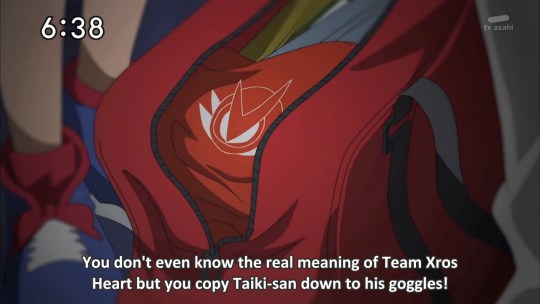
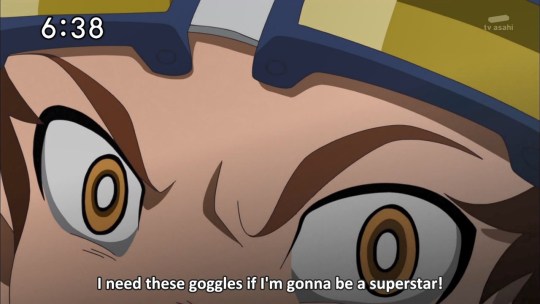
Tagiru basically sees Taiki as a “role model” -- he thinks Taiki is the model of the “superstar” level he wants to attain, and, eventually, surpass.
On the other hand, Daisuke’s circumstances and motive behind wearing the goggles were only implied in the series itself, but fully fleshed out in Spring 2003. In what’s implied to be a metaphorical conversation with his younger self, it’s said that the reason Daisuke started wearing goggles was because of “a person wearing goggles and riding something that looked like a huge dinosaur" -- Yagami Taichi, whom it seems Daisuke did not properly recognize as Taichi at the time -- during the 1999 Odaiba fog incident, when Vamdemon kidnapped everyone. Wanting “the strength to protect everyone”, Daisuke went home and picked up a pair of goggles, and has this to say about them:
...when I wear them, I guess it’s like, my feelings become stronger... ...Because I have these goggles. Even I didn’t know a lot from the start — well, I probably still don’t even now — but when I wear these, I kinda feel motivated… to do anything!
In other words, it’s likely Daisuke didn’t even realize “Taichi-senpai” was the person he was modeling himself after at the beginning -- it’s a bit unclear due to the circumstances of Spring 2003 being somewhat metaphorical, but either way it seems it had more to do with Taichi as “the hero who protected everyone” rather than simply his amazing soccer senior. Supporting this is Daisuke’s cameo appearance in the Adventure novels, which also has him express frustration at being powerless to protect his family.
(But of course, at whatever point Daisuke realized they were the same person, Taichi’s amazing soccer skills and leadership abilities must have certainly helped how much Daisuke adores him.)
Their general demeanor
Both Daisuke and Tagiru, on the surface, seem to track with the sort of “brash shounen hero” stereotype, but even their way of going about things differs greatly!

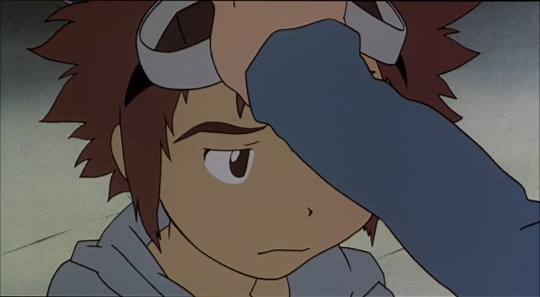
Despite Daisuke having a very “abrasive” surface demeanor -- he tends to get easily irritated at other people, and can sometimes come off as being pretty aggressive -- the truth is that he actually defers to others quite easily. This is especially in the case of the seniors or Hikari, but it extends to pretty much anyone -- the moment someone else puts their foot down, criticizes him, or takes a sufficiently large stand, he has a very strong tendency to back down. The fact that he’s so wishy-washy at the beginning of the series is a huge part of his character development, especially since the end of the Kaiser arc and the second half of the series are when he starts to make a serious stand about major things he cares about -- such as stopping more casualties at Chimeramon’s hands, or reaching out to Ken -- but he does still have some degree of deference to his friends’ opinions, and of course especially his seniors. At the very least, even if he gets argumentative, he’ll actually debate it out with them and try to make his case. In other words, Daisuke spends the course of 02 learning to be assertive, but he’s actually not as aggressive as his initial demeanor suggests.
In fact, Daisuke has often been described as being a lot like a puppy, which is something I find to be rather incredibly accurate -- he gets easily riled up or defensive, but in actuality is eager to please others and is otherwise not very threatening (especially if you give him attention).

For what it’s worth, as much as Daisuke seems to often have a lot of confidence (he does the usual shounen hero schtick of gloating about taking enemies down and all that), it’s very rare he actually talks about himself or shows any moments of pride or self-esteem. Even his joking that he might make the national soccer team was that -- a joke -- that he snapped out of the moment Taichi criticized him, and the same episode has him not even entertaining the illusion that they might win against the Tamachi team -- he’s just happy to play them at all. By the time of Kizuna, he’s rather grounded and realistic about his position and abilities in terms of how to approach his career aspirations -- overall he doesn’t actually seem to have a lot of self-awareness, positive or negative, and can be quite humble when it really comes down to it.
Considering that, it makes sense that Daisuke was able to settle for such a simple career aspiration (ramen making) -- he’s not that ambitious, and he doesn’t shoot very high. He’s happy with what he’s able to do, and while he of course wants to succeed in that and do his best, he's still satisfied with not aiming all that high.

Moreover, while he of course tends to be the one who wants to charge forward, it’s quite easy to hold him back if the others advise him that it’s a bad idea (see: 02 episode 7). During times he does put his foot down because he really, really believes it’s the only thing that can be done, Daisuke is actually forgiving of those who don’t want to charge in forward as easily as he does; in both episodes where he chooses to push on forward when the others are hesitant (02 episodes 20 and 48), he holds no ill will towards the others staying behind and simply informs everyone that he’ll go in alone if he has to.

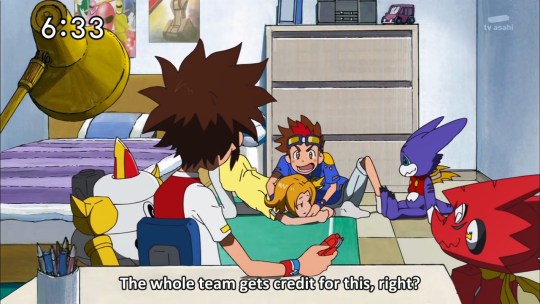
Tagiru, on the other hand, is actually as aggressive as his demeanor suggests -- he’s not nearly as deferential as Daisuke and doesn’t “deflate” as easily, is much more willing to argue with others (or disregard them and go off on his own if he sufficiently dislikes what they’re doing), and is rather generally brimming with pride and a lot of self-assuredness in being great and awesome. Unlike Daisuke, he is absolutely ambitious and wants to shoot for the highest thing he can possibly be -- hence why he wants to not just be like Taiki but surpass him, because he has the drive to push himself as far as possible.
Tagiru also has a tendency to try and “claim credit” for things (the basketball match in episode 1, the above scene in episode 14); most likely Daisuke wouldn’t even bother (except, perhaps, in the occasional moment of weakness when he’s trying to impress Hikari-chan). Moreover, Tagiru doesn’t need any permission to charge in whatsoever; he’ll do it if he wants to, regardless of what others tell him.
This also contributes to Tagiru being much less of a team player than Daisuke is -- making him excel much better in Hunters’ battle royale format in which his aggressiveness helped him compete in a game where everyone was playing for themselves. It’s likely he would have done very poorly in Daisuke’s situation, where team coordination and bonding was important to their adventure, and, conversely, Daisuke, who’s reliant on others and constantly deferential, would probably have performed very poorly in the Hunt.
V-mon and Gumdramon
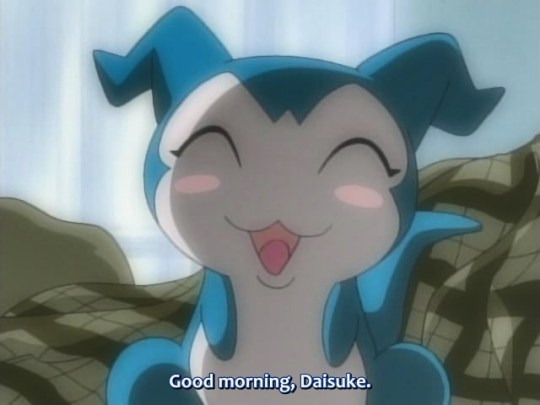

Personality-wise, I think it’s generally understood that Daisuke and Tagiru’s actual partners have rather little similarity, and everything is mainly aesthetic (being blue dragon-like Digimon) -- V-mon is rather easygoing and friendly, whereas Gumdramon’s competitiveness and mischievousness matches Tagiru’s own. In general, though, I would also point out that this is reflective of the different ways Adventure/02 and Xros Wars approached Digimon partnership as well. In Adventure/02, Digimon partners were effectively part of the inner self, so V-mon was reflective of Daisuke actually being of a quite friendly and agreeable nature when it really came down to it and you got past his abrasive surface demeanor. As a result, Daisuke and V-mon were like-minded almost unconsciously, to the point of being in sync without even trying. (Not that they’d never got into an argument ever -- see The Door to Summer -- but their relationship was definitely more of a “natural clicking” sense.)
In contrast, Xros Wars very much treats Digimon and humans as individual entities in every respect, with “partners” really just being the Digimon each General/Hunter bonded the most with and has as their core battle partner, so there is much more of a significant level of choice between partners choosing each other in terms of whether their personalities click. (The fact that Taiki and Shoutmon were very disparate in temperament and motive was a big part of the first series of Xros Wars.) Nevertheless, Gumdramon and Tagiru are extremely like-minded -- both a little mischievous, and both very ambitious. Of course, both of them being rather aggressive did lead to some friction in episodes such as 7 and 17, but this led to them ultimately bonding more deeply by working through it.
Unlike V-mon, who had no real affiliation with Agumon, and unlike Tagiru, who can hardly be said to be all that deferential to Taiki, Gumdramon does seem to be significantly deferential to Shoutmon...although mainly out of intimidation more than anything.
Round-up
So, a tl;dr in closing:
Daisuke's relationship to Taichi is almost entirely deferential, and Daisuke holds him in such high esteem that he concentrates more on Taichi being amazing more than he ever factors himself into the equation; Tagiru sees Taiki more as a role model and someone to aspire to and eventually surpass
Daisuke’s reason for taking after Taichi with the goggles is out of a desire to protect others the way Taichi did; Tagiru wears the goggles explicitly to imitate Taiki as part of his goal to be a “superstar” and eventually surpass him
Daisuke is generally deferential to others, is somewhat lacking in ambition, and only really puts a firm foot down when it’s something he cares about; Tagiru is actually capable of being aggressive, does not necessarily defer to others, and has significant ambitions of pushing himself as high as possible
Daisuke’s relationship with V-mon is that of V-mon being reflective of Daisuke’s inner friendliness, and the two simply get along naturally in a friendly manner; Tagiru and Gumdramon had to more consciously form their partnership on being more like-minded, which meant that they had to overcome some obstacles in their relationship due to both of them being more on the aggressive side.
#digimon#digimon adventure 02#digimon xros wars#digimon hunters#digimon adventure last evolution kizuna#motomiya daisuke#akashi tagiru#daisuke motomiya#tagiru akashi#shihameta
78 notes
·
View notes
Text
this is very rambly and probably won’t make much sense so apologies for that in advance, but I’ve been thinking about this for a LONG while
Mahiru has been pretty pivotal to Every Character arc in Servamp, either through being an active participant who moves the hearts of the people involved, or being the starting point for change in an individual by giving them a gentle nudge down their path. There are only two arcs he actually has very little to do with, and coincidentally, both of these arcs involve character who instead have larger impacts on HIM
Greed pair, and Wrath pair
Greed pair is interesting because you can actually make an argument that he did play a pivotal role by being the starting position for Lawless and Kuro's repaired relationship because he was very insistent upon meeting with Lawless, or through his interactions with Lilac. However, he did not actually have anything to do with Lawless overcoming his feelings of grief, and instead was moved to action by Licht and Lawless, considering things he never did before because of things they said to him.
Lawless forces Mahiru to consider the important questions, the way he’s going to go about doing and achieving and moving forward with whatever nebulous plan he has, because at the time of the theatre fight, Mahiru really didn’t have anything in mind beyond a blanket “I need to stop Tsubaki” and the plucky boldness to attempt to go through with that.
Meanwhile, Licht is a perfect example of someone who has ideals, the gumption to go through with them, and the skill to back up his claims. His capture at the hands of Higan while protecting Mahiru also forces Mahiru to consider the consequences of rushing into things without a proper plan, as well as face the reality of what it means to protect someone.
Even through these changes, I feel like Mahiru planted some seeds within the hearts of both halves of Greed pair and his interference was the starting line for their bettered relationship down the line.
But Wrath pair? Mahiru had literally nothing to do with Iduna or Shamrock's growth, and only a barely passing interaction with Shuuhei that was actually set up for Iduna to come forward and say something powerful to Mahiru instead "A world of hate... Is a sad, sad place." (Chapter 15) And I love that the characters that move Mahiru at his core and spur him onward in his growth as a person are the humans, the ones who put their heart and soul into creating, these ephemeral creatures with so little experience under their belts in comparison to the immortals in the series but still hold so much wisdom.
And it is very rare for there to be a series where the protagonist isn’t the catalyst for every bit of development a character or set of characters goes through, even rare for there to be a female character who controls her own narrative and is the one pushing it forward instead of being the motivation for a male character. For Iduna, it’s quite the opposite!
I love that the first time she cut her hair, it was an act of solidarity with her friend mourning the death of his father. A promise to herself to support and aid him however she could. The second time... Was a promise to save him from the cliff she had unwittingly pushed him off of, yet again resolving to change and grow in order to become better than she was before.
Speaking of which! She also has the strength of heart and mind to look at what she’s done and say “I’m going to do better. I’ve hurt people. This time, I’m going to be different. I’m going to help them.” That takes heart. That takes courage. That takes humility and understanding and so much love for the world. Because there’s absolutely no guarantee that anyone will forgive her for what she’s done. But it’s not about receiving forgiveness. It never has been.
Like, Iduna is literally SHOT IN THE BACK by Shuuhei, and merely admonishes him for it before continuing to HELP HIM. (And maybe she views that as her punishment for letting things get as bad as they did. For letting thing go as far as they did.) And then she chooses to spare the man trying to murder them, because she can see... He’s let go of his anger, and left in its place the sad, pathetic man struggling for a reason, a justification, something
Some people might see this as her being too perfect, too sweet, too naive and kind and mary-sue-ish.
But
Depending on how you look at it, her actions are rather cruel. Shamrock is going to carry that guilt and grief for the rest of his existence. The same way she will carry hers. She is so much more than bubbly sweet cupcakes and girlish antics.
She is strong, and brave, amazingly intelligent, hell, even Touma praises her! She's not stupid by any means. She's a remarkably well crafted character
God though, what gets me about her sparing Shamrock is that... She knows that punishing him is not her choice to make. It's the choice of the person he's hurt
And she believes in Shuuhei and his ability to claw his way back up and take the hands of the people who love him, before he does something he can never take back.
Revenge is not rational
Shuuhei only plays at rationality when he's actually a very emotional person who makes impulsive decisions and clings on to anger because it's the only thing keeping him going, and he's scared of what will happen when he doesn't have that anymore. Iduna, in contrast, despite appearances, is actually a very logically minded person.
But logic doesn't make you cruel any more than emotions make you kind, now does it?
#kat's katerwauling#servamp#servamp meta#Izuna Nobel#mahiru shirota#kat's meow#THIS GOT SO FUCKING LOOOONG DFJKGHFJ#normally i like to provide images from the manga to better illustrate my points#but not tonight lel
125 notes
·
View notes
Text
How Black Clover Gets Lady Characters Right
*Spoilers for most of the Black Clover anime (mostly character related stuff, not much in the way of major plot stuff)*
Black Clover is right up there with Gintama in terms of shows that reward viewers for sticking with them through some mediocre early episodes and arcs. When Black Clover began airing, I was excited. Manga readers had been hyping the series up, and it sounded like the next big shounen fighting anime that would take anime fandom by storm. Then I started watching it, and I was immensely disappointed. I found Asta’s constant screaming almost unbearable (to the point that I started muting the tv when it looked like he was about to open his mouth). The early episodes were totally predictable and cliche. The animation was, at times, embarrassingly bad. But I stuck with it because there were a few elements that kept me interested. One was the absolute bangers of opening and ending themes (at one point the thought crossed my mind that they were entirely too good for this show). Another was Yuno, whom I liked from the start. Then there’s the fact that Asta’s magic, or lack of magic, was the one element I didn’t predict a mile away. I honestly expected him to awaken to some super powerful magic early on. Almost 200 episodes later, he is still magic-free. I really did not see that coming. Still yet, I came close to dropping the series several times during those first thirteen episodes or so.
Somewhere around the time they went to the undersea village (I don’t remember the name of the arc), I began to notice that I was actually looking forward to each new episode. It was a gradual change from being at the bottom of my watch list to being near the top. So gradual it took me a while to realize it. The show still had some problems, sure, but it stopped being predictable. Asta talked more and screamed less. More interesting characters were introduced. The fight scenes were exciting. By the time this arc was over, Black Clover had become a favorite. So, if you tried the series and found it boring and annoying, consider giving it another shot. Like I said, it rewards you for sticking with it.
One of the best things about Black Clover, for me, is how it treats its female characters, especially when compared to other popular shounen fighting anime. It is by no means perfect, and I’ll talk about the show’s minor failings in regards to its ladies a little further down. But overall, it does a phenomenal job.
The first thing that struck me about Black Clover’s women is just how varied they are. There’s a surprising range in their appearances, personalities, and skills. And there are lots of them. Far more than a lot of other shounen fighting anime allow. There are five women in the main squad, the Black Bulls, alone. And we see that each squad has several women as well. Then there’s the all-women squad the Blue Roses. This extends to the villains, as well as the non-combatant supporting cast as well.
Speaking of skills, the women of Black Clover are unusually powerful. The two male leads, Asta and Yuno, eventually get “power-ups”, some kind of new form or transformation or whatever. This is super common in shounen fighting anime. What’s not so common, however, is the female lead getting her own cool power-up/transformation. This is what happens for Noelle, and it was such a great surprise. A little side note here: I’ve been watching the series on a streaming site that allows comments, and I was so amazed by the comments on the episode in which Noelle gets her power-up. The (mostly male, judging by their names) commenters were genuinely happy for her! They were proud of her for getting stronger and cheering her on! I didn’t spot a single comment about her looks or how great of a waifu she is (at the time anyway).
But it wasn’t just Noelle that got stronger. Another Black Bulls member, Vanessa, got an interesting power-up of her own, in the form a cat familiar that basically makes her and her teammates completely impervious to harm for as long as her mana holds out (which has saved their lives countless times). Another lady, Grey, has recently (in the anime) demonstrated some shockingly powerful magic that none of her teammates, or even she herself, realized she was capable of. Then there’s Charmy, who was already quite powerful but gained her own powered up transformation that made her strong enough to defeat an elf-possessed Magic Knight captain. If anything, the ladies have received MORE power-ups than the men.
And while we’re talking about powerful women, I have to talk about Mereoleona. If you’ve watched the show, you know exactly what I mean. If you haven’t, just imagine a character who can curb-stomp a powerful villain who is on a higher level than villains that the main characters were struggling to team up against just a few episodes before, who can then take on a whole group of these powered up villains and remain standing, even after losing consciousness, because they’re just that badass. Now imagine that character is a woman. And she’s so terrifying that one of the elf-possessed enemies (her comrades who had their bodies taken over by elves) remarks that his body froze up because, even though he’s controlling it, the BODY ITSELF was afraid of her. Mereoleona is an absolute beast, the kind of character that is almost always male in these types of shows. And the best part? The icing on this badass cake? The only person who was stronger than her, who could defeat her one-on-one, was ANOTHER WOMAN. Noelle’s mother. And a huge part of Noelle’s motivation as a character is becoming strong like her mother.
On the subject of Noelle’s motivation, I really appreciate that it has nothing to do with her crush on Asta. Sure, she likes him, but it’s not a motivating factor in her life and it’s not even really that important to her story arc. Her arc has always been about HER, about becoming stronger, living up to her powerful family’s expectations, discovering the truth about her mother’s death and then about avenging her, about becoming more empathetic to the common people despite being royalty. Noelle’s story is ABOUT HER. And it’s really sad that this is something remarkable, but we’ve all seen the “heroines” with no real arcs of their own, or worse, their arcs revolve almost entirely around their love for a male character (Sakura from Naruto is the most obvious example here but anyone who watches a lot of shounen can no doubt name many more). And Noelle isn’t an exception in Black Clover. Almost all of the women have interesting back stories and character arcs that have little to do with men (or if men are involved, they’re in supporting roles to these stories and very rarely the main subject).
An exception to this is possibly Charlotte, who is in love with Yami and this plays a big role in her story. However, even this is framed in a way that puts the emphasis on her own growth. It’s really about her learning to be honest with her feelings and getting over her own awkwardness around Yami. A big moment for her is when she admits to her squad that she’s in love with Yami, and they’re all eager and excited to help and support her, like the wonderful ladies they are.
Now, as I said before, Black Clover’s depictions of women are not perfect. There are a few issues I consider minor that I need to address. The first is the tendency the show has of making almost all the ladies be in love with someone. A large portion of the women are sporting crushes, though some of them are quite subtle or mainly used for comic relief, it’s still a little annoying that so many of them are in love. Of course, many of the male characters are in love with someone too (including the protagonist, Asta) and there are several female characters who are totally disinterested in romance, so I can overlook this. Another small issue is that, even though there’s more variety than usual in the body types (one female character is fat and another, Charmy, often gets quite pudgy for extended periods of time, plus a few ladies have more muscular builds), a significant portion of them have very large breasts, including two teenage characters (Noelle and Mimosa). It feels a little unnecessary, to be honest. Though to be fair, it’s rare that any of these characters are used for fan service and the camera never really seems to linger on their bodies. Most of them dress fairly modestly and among those who don’t, the more sexy clothes fit their characters and make sense for their personalities.
The last minor issue I have is that we often get the “designated girl fights”. If there’s a female villain, it’s likely that a female hero will be the one to fight her. This isn’t a rule set in stone, because there are plenty of male/female battles, but it happens enough to be very noticeable. Of course, these lady villains are demonstrated to be just as powerful and dangerous as the villainous men, but it’s still mildly irritating.
Those little nitpicks aside, Black Clover is still a shining example of a shounen fighting anime getting its ladies right. The women in the series are well-written, interesting characters with compelling stories. They’re powerful, have wildly varying personalities and motivations, and never feel like window dressing. They’re not just there to be pretty romantic interests. The show does all this very well, and I think it deserves a lot of praise and credit for it.
22 notes
·
View notes
Text
Top 5 Favourite Beyblade Characters
Random and unasked for but I figured I would talk about my favourite characters in the Beyblade Metal Saga.
#5 A tie between Chris and Hikaru
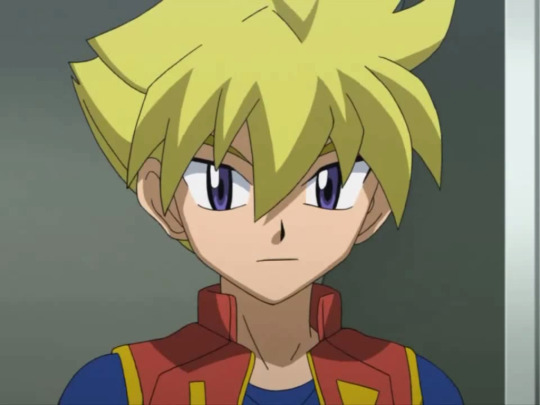
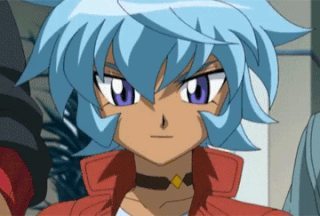
Chris
I’m putting these two in the same spot because I wanted both of them to be on this list and a “top 6” doesn’t have as good of a ring to it as a “top 5.” Anyways, the first time I watched Metal Fury, I didn’t care much about Chris. Now however, I find his arc of being stuck in a job that brings him no joy to be incredibly relatable. His lack of passion for Beyblade makes complete sense: the fun of the sport was completely sucked out when it became an obligation for him and he wasn’t allowed to fight for himself. He was completely obligated to his employer and had little choice in the matter. That would suck away anyone’s passion, trust me, I know. So seeing the light return to his eyes as he rediscovered his passion for Beyblading was incredibly satisfying.
Hikaru
A lot of the appeal of Hikaru is admittedly that she is a female blader, and yeah, it is great having a strong female character. (We need more of those) What’s great about Hikaru however is that she isn’t just a token girl character or a mary sue: she is treated the same as any other blader and is allowed to fail and feel emotions without being degraded. I like that we even see a bit of her backstory where we learn that she is driven to be the best blader because of her likely deceased mother’s words. It’s a shame that she quit Beyblade due to her trauma but I also think it’s understandable and that it was interesting to explore that trauma. The moment that broke my heart rewatching Metal Masters was when Hikaru sees Dark Tsubasa and is paralyzed by terror, clearly remembering what Ryuga did to her. Beyblade’s most powerful scenes to me are the ones that delve into a character’s mind and allows me to see their thoughts and feelings. It allows me to understand and be more attached to the character and we got a lot of that from Hikaru and Chris.
#4 Yuki

Yuki is kind of underrated in my opinion but then again, so is the entirety of Metal Fury. Yuki was a really fresh character for the series. Nearly every character is extremely reckless: acting first, thinking later so it was really refreshing to see a character who overthinks everything to the point of anxiety. I just relate more to a character that doubts himself and has to fight to overcome not just the great evil but his own self-doubt and fear as well. Also, I love that scene where he fights Ryuga. He probably knows he doesn’t stand a chance against a guy like him but he doesn’t care because he’s fighting for his friends. I can relate to that. When I’m just doing something for myself, I tend to doubt and question myself but when I’m standing up for my friends, I show no mercy. So yeah, Yuki is a really relatable character, as well as a pure cinnamon roll that needs more love.
#3 Kyoya

If you asked who my favourite Beyblade character was two and half years ago, I would’ve answered “Kyoya” without any hesitation. While I do still really like him, I think his character was kind of fumbled in Metal Fury. I’ll talk about that separately though because I want this to be a positive post. Still, Kyoya is a great character. I like how he develops from a villain to that one liner asshole friend of Gingka’s. While I do like him unironically, Kyoya is honestly just funny to me. He is so ridiculously arrogant about his own skills but he actually is as good as he says he is. He’s also a tsundere. He’s absolutely a tsundere. He’s always helping his friends with whatever bullshit they’re doing: helping them infiltrate the Dark Nebula, going to look for Gingka when he disappears, helping them infiltrate Hades city, going with them to look for the Legendary Bladers, and on two separate occasions, staying behind to fight someone so the others can go forward. Even his determination to beat Gingka feels more like friendly competition than actual malice. And yet he insists he doesn’t care about them with lines like, “It’s not like I came to save you or anything.” It’s honestly kind of majestic. He’s also a complete badass. He always gets back up after a loss and fights to the bitter end and, sometimes to the detriment of himself but never his Beyblade. When Leone was on the verge of breaking to pieces in The Fearsome Libra, he forfeited the match to stop that from happening, risking humiliation and accepting defeat to do the right thing. That is genuinely admirable. It takes courage to fight but even more courage to admit defeat. Also, his fight against Ryuga in Metal Fusion is insane. Kyoya nearly falls so many times but keeps himself on his feet and rises up again. It takes being stabbed in the heart by the dark power for Kyoya to be defeated. Out of everyone, Kyoya came the closest to defeating Ryuga through sheer will and determination alone. What a badass.
#2 Tsubasa

Similar to Yuki, Tsubasa is also a pretty unique character for this series. While he is passionate about fighting like all the others, Tsubasa is much more thoughtful and cool-headed, which is appealing especially among a cast of hot-headed crazy characters. When Tsubasa is first introduced, he’s kind of a mystery. We don’t know his true intentions or alignment until we learn that he was working for the WVBA, about 15 episodes after his initial introduction. This unpredictability made him interesting to watch in Metal Fusion as I didn’t know what he was going to do next. Then in Metal Masters, he becomes even more interesting. While it was emotionally intense to watch, I think the “Dark Tsubasa” arc is one of this series’ greatest achievements. It revealed a completely new layer of personality to Tsubasa and gave him so much development.
While he was being somewhat controlled by the dark power, it is made clear through the dialogue that that side of him was always there and the dark power just enhanced and unmasked it. He did often hide his true emotions and intentions in Metal Fusion after all. The scenes where Tsubasa interacts with his dark self are very interesting and relatable to me because I often try to hide my negative emotions and avoid situations where they might come out until those feelings fester into madness, which is essentially what Tsubasa did. However, the resolution to this arc is what makes it so special to me. Tsubasa doesn’t drive out the darkness or continue to repress it: he accepts the darkness as part of who he is because everyone has darkness in them and the way to control it is to become one with it. And in the end, he becomes a stronger blader and person as a result of this arc. This is legitimately inspiring and helpful to me. It’s important to remember that we are not defined by our worst thoughts/feelings, we are defined by how we handle them and accepting ourselves, flaws and all, is important. So really that arc alone makes Tsubasa one of my favourite characters but he also has an appealing personality as well. It’s a shame he was kind of underused in Metal Fury but I love what we got from him.
#1 Ryuga

Yeah, okay, this was obvious. Take one look at my feed or even my profile picture and you could probably guess that I love Ryuga. Two and a half years ago, I hated him with a passion but after rewatching the show again, I realized I only really hated him because of what he did to Hikaru, Tsubasa, and Kyoya which yes was horrible and I don’t condone it in any way but he was under the influence of the dark power at that point and he never does anything quite that awful again. Anyways, onto the positives. Ryuga in Metal Fusion is the best villain the show ever had. He poses a significant threat and was the first person to legitimately defeat Gingka. He’s also a terrifying sadist that cackles at others’ pain. If Ryuga had stayed like that, I would probably still like him as a character but I certainly wouldn’t have developed a crush. Damn, that would’ve been nice. But alas, even in Metal Fusion, Ryuga is somewhat sympathetic when you remember that he is just a kid and was both used by Doji and not even in full control of himself because of the dark power. He is seen trying to resist its control in the final battle after all. It’s interesting to see a character who is literally corrupted by the power he sought out and actually does learn from his mistake. In Metal Masters, he realized that humans’ greed and hatred was what caused the dark power to be so harmful and decided to draw the power from its original source, before it was tainted by humans, and became super powerful. Even if you hate Ryuga, you have to admit that is awesome. And once he stopped being a sadistic villain, he became much more unpredictable as sometimes he would even help the main heroes in Metal Masters, albeit for selfish reasons. Ryuga sort of feels like a combination of traits I liked most in Tsubasa and Kyoya. He has the unpredictability and loner attitude of Tsubasa and the confidence and determination of Kyoya. Also, I don’t think I need to say that Ryuga is a badass. That’s not even an opinion: it’s something that we all know to be a fact. I mean, this is the guy who launched his Beyblade at a floating city, wrecking it enough to send it crashing into the water and causing a reactor meltdown that nearly destroyed the earth. That last part was unintentional and in all fairness, he did help stop the end of the world, but still, he is both powerful and reckless enough to do something like that. He was kind of frustrating in Metal Fury but I did like his friendship with Kenta and while his blind pursuit of power was annoying, I gotta admire the ambition. And… yeah, I cried at his death. I cried harder at that than anything else in this show at any other point I watched it, including when I was a kid even though I knew it was coming. Even though his motivations for fighting Nemesis were far from righteous, he still died trying to defeat the great evil and his final act was giving Kenta the star fragment to give the heroes the chance they needed to win. Ryuga died a hero, plain and simple. I wish he had lived so we could see him develop even more after that moment but either way, Ryuga is a great character. He’s the best villain in season one and I love his fiery personality and aesthetic in the following seasons.
#beyblade metal saga#chris#yuki mizusawa#hikaru hasama#kyoya tategami#tsubasa otori#ryuga#ryuga kishatu#yuki#hikaru#kyoya#tsubasa#metal fury is underrated#I have my problems with it#but it's just as good as the first two seasons in my opinion
41 notes
·
View notes
Text
Haikyuu!! Observations: Ushijima x Sakusa, Ft. Komori and Tendo
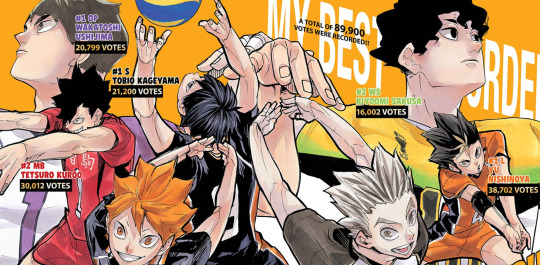
**SPOILERS FOR ANIME ONLY’S BELOW**
Okay, am I about to dive into a lengthy post about why UshiSaku may be endgame in Haikyuu!! and how Tendo may be the best wing man for it all?
Uhm, yes. Yes, I am, so bear with me.
I’ve been stewing on this for a while now, so there’s a lot to cover in this post. Let’s dive in!
Ushijima and Sakusa’s Parallels
Okay, first things’s first -- let’s talk about Ushijima, Sakusa, and the parallels the Manga has made with them. Starting with their views of Shoyo Hinata. Let’s begin with Ushijima. While the stereotypical characterization of Ushijima is to make him completely stoic and unfeeling, Ushijima DOES have emotional responses, especially in the manga -- for example, his reaction on the court to Hinata is MUCH stronger than I believe the anime shows:
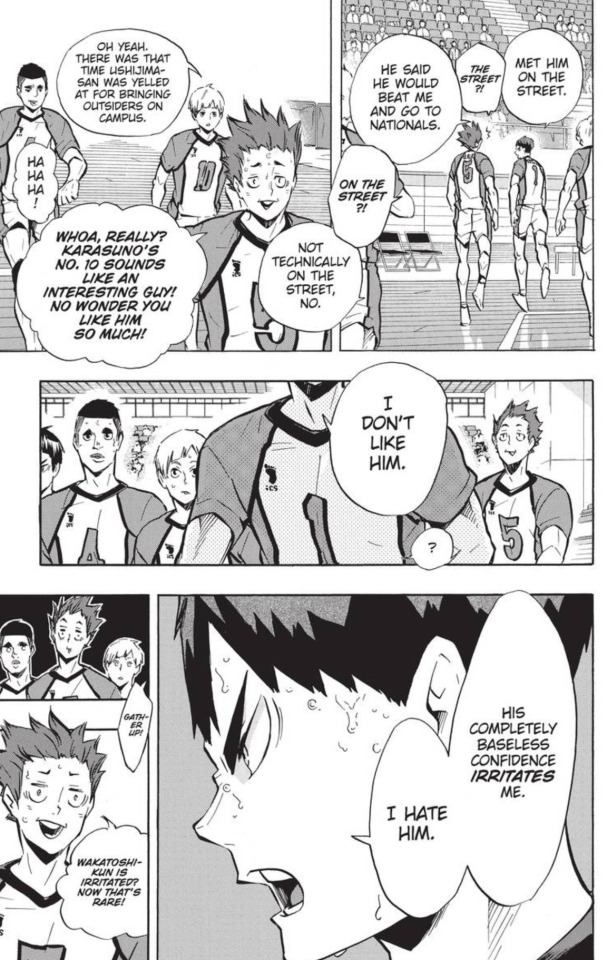
This is developed further in the Shiratorizawa vs. Karasuno match -- as Ushijima struggles with the fact that Hinata is not a skilled player -- he just has natural athleticism and his actions are half “luck” and half the gutsy collaboration of his actions alongside the “reckless” and “wild” other players of Karasuno.
This idea of “luck,” interestingly enough, will come back with Ushijima nearly 200 chapters later...but we do establish here, that Ushijima is the type of person that admires and respects strength, and efforts that are backed by natural talent and disciplined training. It’s only natural that Hinata frustrates him, because at this point in the manga, Hinata and “disciplined training” aren’t exactly words that go together (more on that below).
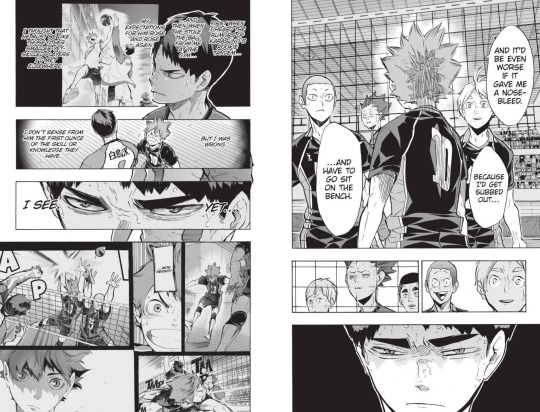

Verrry similarly, Sakusa has no room for people who lack discipline, though his “discipline” relates more to personal health than just physical preparation for a game. This comes in direct focus in a flashback during the Black Jackal vs Adlers game, when it shows Sakusa first meeting Hinata. Unlike Ushijima, it doesn’t seem like he “hates” Hinata, just has absolutely no desire to be around someone that lets themselves get sick...and he only allows himself to be open to Hinata as a teammate after Hinata expresses that he has indeed grown up since High School.
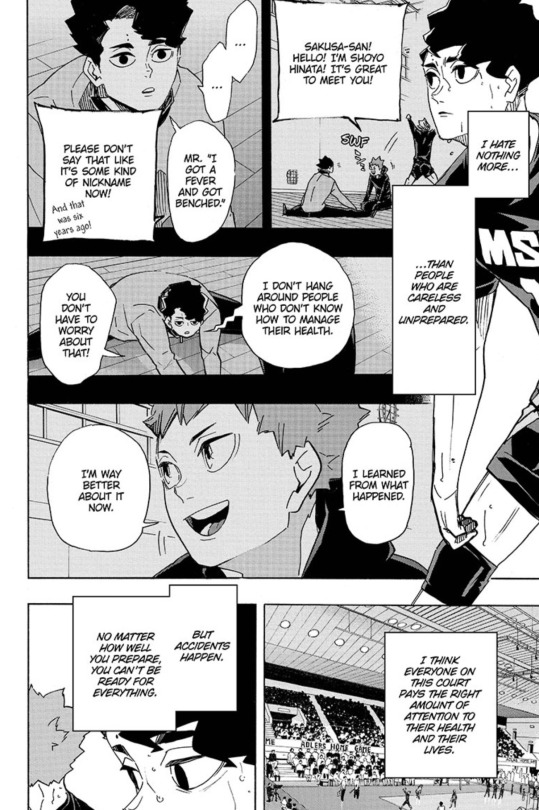
The manga also points to parallels of how they handle defeat, showing both Ushijima remaining proud and quiet after their loss to Karasuno, only quietly declaring to Hinata and Kageyama that he would “beat” them again --
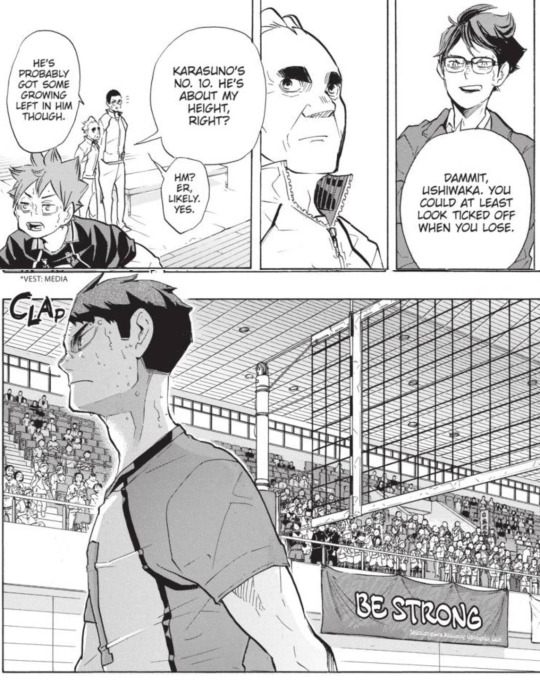
While with Sakusa, he’s more vocal in his musings about losing, in Chapter 368 stating that it would hurt more to be pitied, especially when you did all you could do, and still suffered a defeat. Itachiyama losing their setter could be viewed as “bad luck” in the final set, but Sakusa points to luck not having so much bearing as just it being the result of fate and unstoppable forces in the moment. Ever the realist, Sakusa...(again, more on “luck” below).
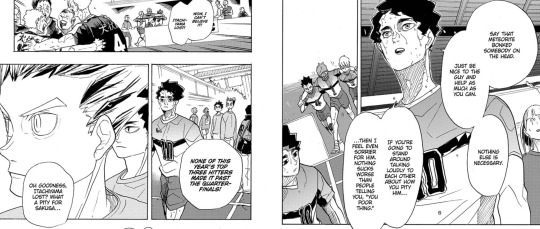
Sakusa objectively presents the fact that they lost in very simplistic, albeit nihilistic terms, and similarly, Ushijima doesn’t shy away from using objective information and putting things in simplistic terms without hyperbole. This can be seen through his conversation with Goshiki below.
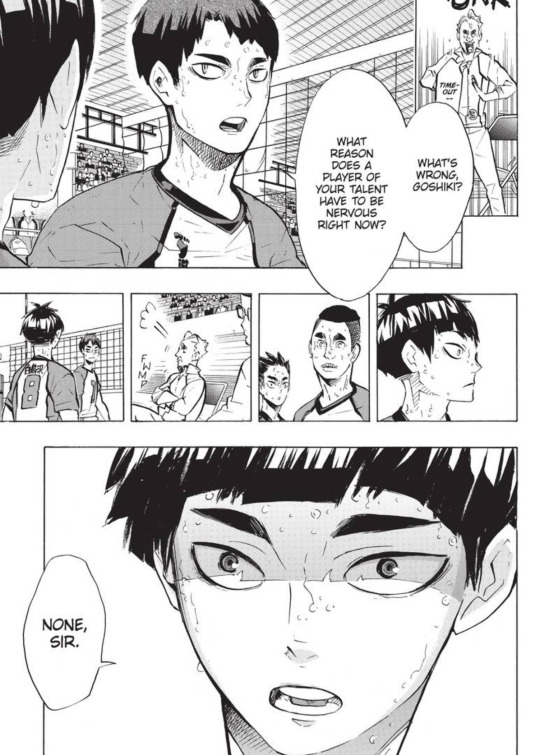
Ushijima and Sakusa’s “Type”
So, if we’re going to even possibly ship these characters together...does it work? It becomes clear, through the manga and anime, though that both Ushijima and Sakusa admire players who are powerful, can present a legitimate challenge to them, and therefore spurn them to become stronger players, too.
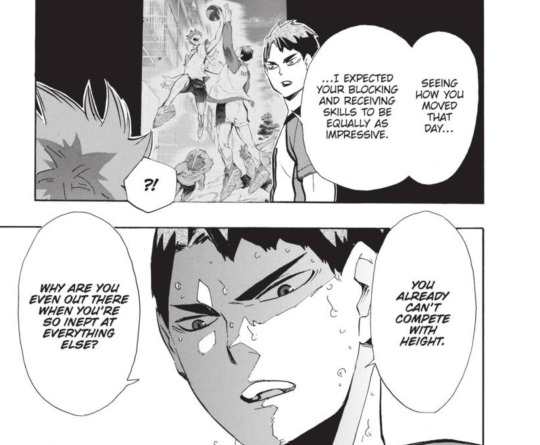
Both Ushijima and Sakusa are portrayed as incredibly strong right out the gate in the manga, which makes sense as both are in the Top Three Aces for high school volleyball. However, unlike Kiryu (the #2 Ace that is depicted as more down-to-earth, friendly, compassionate, and relatable to our other protagonists), both Sakusa and Ushijima have “colossal protagonist” vibes -- seeming larger than life, incredibly stoic, and emotionally distant to others on their team, even if they are around them constantly.
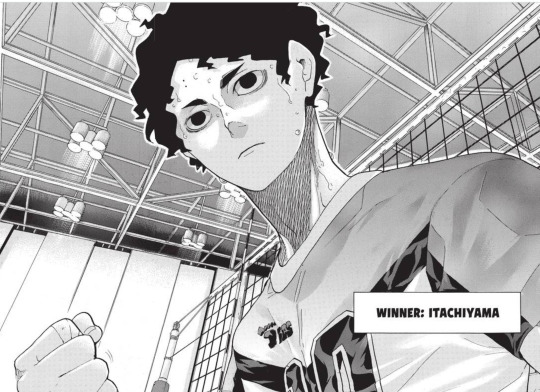
And then, concerning Sakusa...there’s the infamous Chapter 394.
If anything has established what Sakusa’s “Type” would be, it would be these two panels. Ushijima is checking off all of the boxes for Sakusa: Understands personal hygiene? Check. Someone offering Sakusa a challenge as a competitor, and motivating him to keep moving forward and practicing? Check!
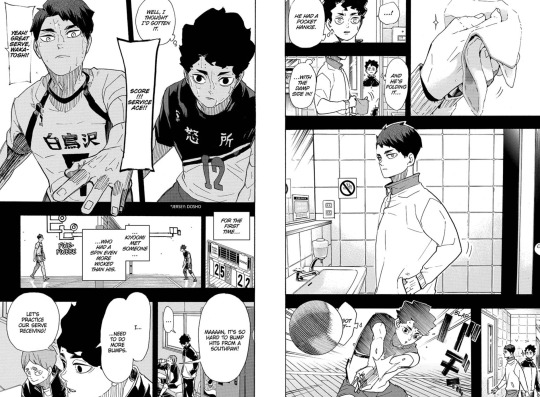
Chapter 394 answers many questions, and points us to the observation of:
Sakusa’s “Pining”
Furudate, we see Sakusa lazer-focused on Ushijima from the other side of the court...you’re not fooling us:
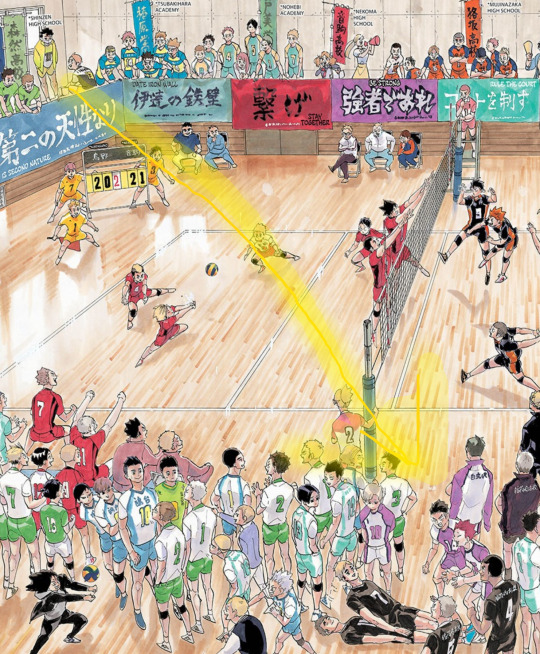
Hey, remember where the mystery of Sakusa and Ushijima’s relationship began? Waaaaay back, after the Shiratorizawa match, after the Fukurodani/Nekoma matches; at the start of the National Japan training camp that Kageyama attended in Chapter 209.
A camp, where it was noted by Karasuno, that Ushijima had been the chosen representative of their prefecture for at least the last year.
And who is the first person Kageyama runs into at this camp?
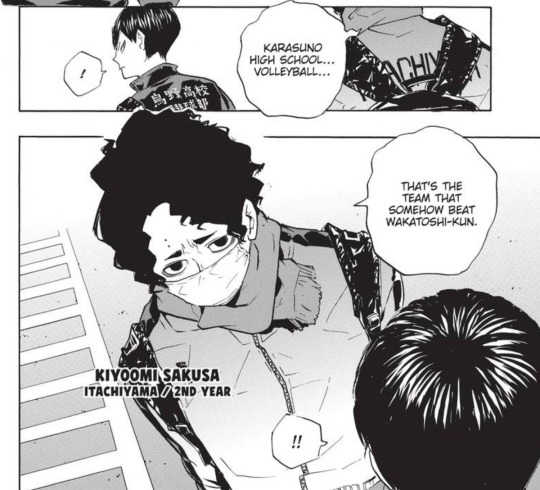
And the first thing Sakusa states isn’t a proper greeting, it’s not about how they beat Shiratorizawa...it’s how the team “somehow” beat WAKATOSHI-KUN.
The next time we get interactions from Sakusa, he immediately jumps on the offensive, DEMANDING to know who the player was that led to Shiratorizawa’s downfall:
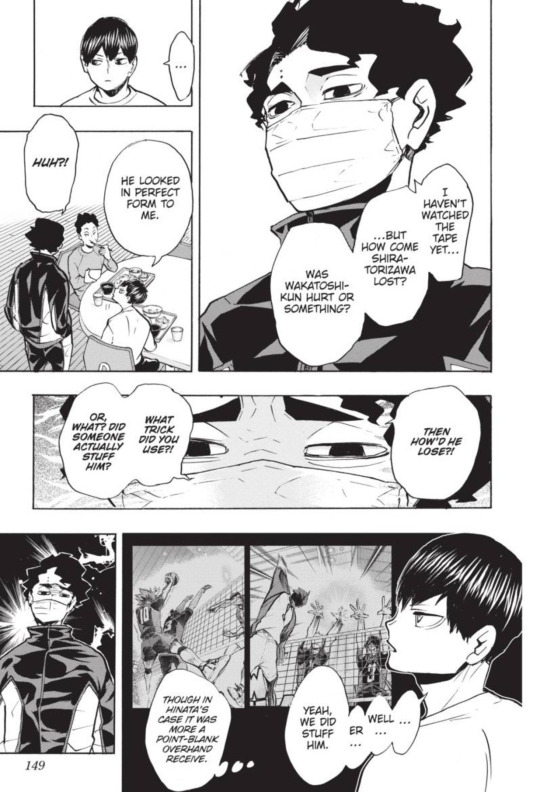
It’s interesting that Kageyama implies the “entire” team was responsible for Ushijima’s defeat on the page before this one below, but of course, Kiyoomi does not pick up on this. Then, leave it to Komori to come in with the save. Again, tying Kiyoomi to being a “realist,” which will come into play below.
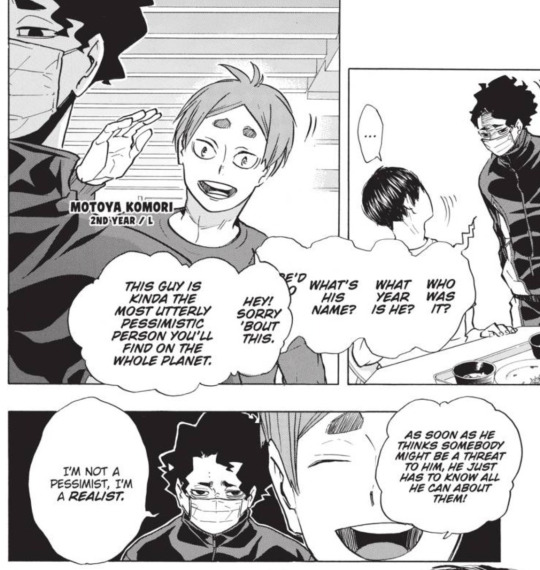
So, it isn’t until Chapter 394 that we learn about Sakusa’s long-standing history of playing Ushijima in various matches, developing this competitive rivalry with him that has been going on since middle school. Ushijima is literally the one obstacle that he finds himself unable to surpass; the one piece of the puzzle he can’t put into place yet.
It’s no wonder the fact that someone defeated him irked him so much.
We get a little more context from Komori on Sakusa and Ushijima’s rivalry, and more on the flashback on their Nationals loss which will tie into my last point.
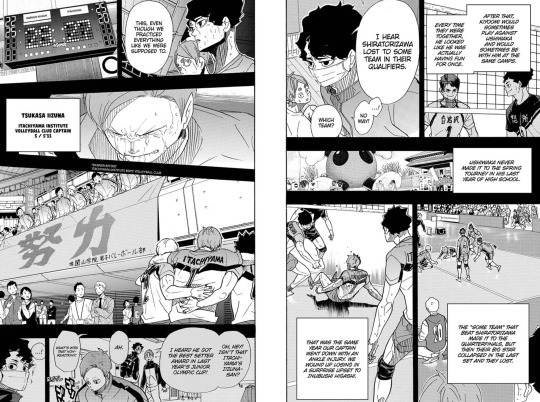
Motoya Komori
I would be remiss not to bring up Motoya Kamori’s role in all this.
I think it’s verrrrrry interesting the route Furudate chose with Komori, specifically in revealing that he’s Kiyoomi’s cousin.
This makes a LOT of sense, considering how closed off and antisocial Sakusa is. It justifies not only why Komori is so keen to stick by Sakusa’s side, despite his seeming apathy towards his presence, but it also justifies why Kiyoomi even sticks with Komori: he really doesn’t have a choice. Komori’s family.
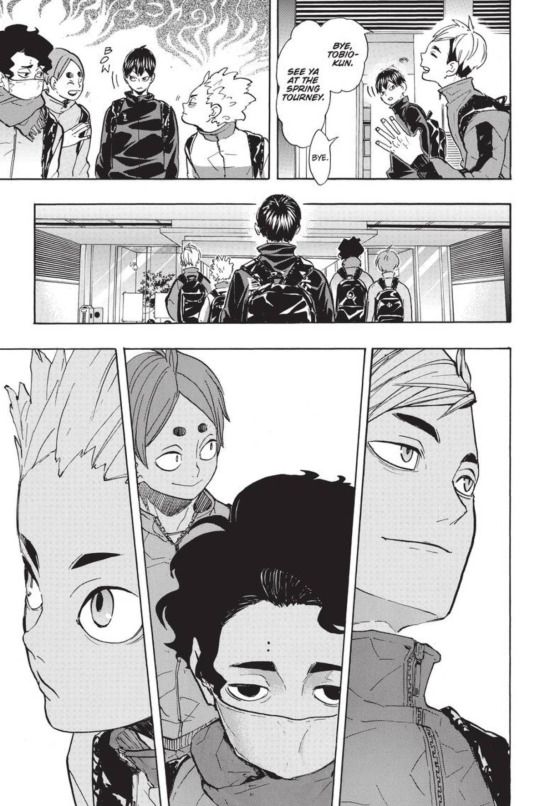
Side Note: Ever get the impression that Komori and Kageyama could be a fun friendship/pairing? I mean, the top setter and top libero? Komori seems genuinely friendly with Kageyama, both at the training camp and when they see each other at Nationals, commenting on Sakusa being out of his element...
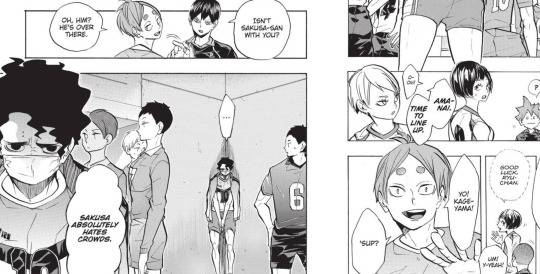
...Juuuuust a crack pairing side note! Spread the word! Now, back to the post!
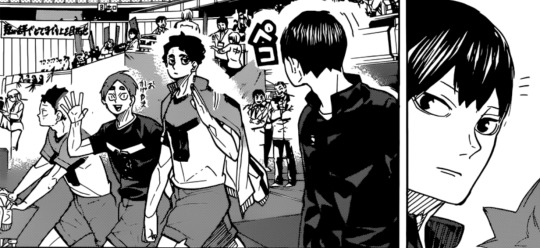
Komori becomes our main expositor about Sakusa in Chapter 394, noting how osbsessive compulsive he is, especially in finishing anything he starts. It’s just an odd choice for me, to make Komori his cousin. True, it goes against the stereotype that all family HAS to look or act like each other, and it does make sense to why their friendship is so strong.
It’s just a move that Furudate hasn’t pulled the entire manga, and it comes right at the end of the series...and it disrupts Furudate’s tactic of giving us characters in “pairs” that, as some reactors have noted, are ripe for instant shipping.
Coincidentally, right as we start to make connections between Sakusa and Ushijima. It’s almost as if Furudate sank the Komori x Sakusa ship with revealing their relationship, just in time to reveal the answer to our mystery of why Sakusa refers to Ushijima in such a familiar way...and let that ship sail. How poetic.
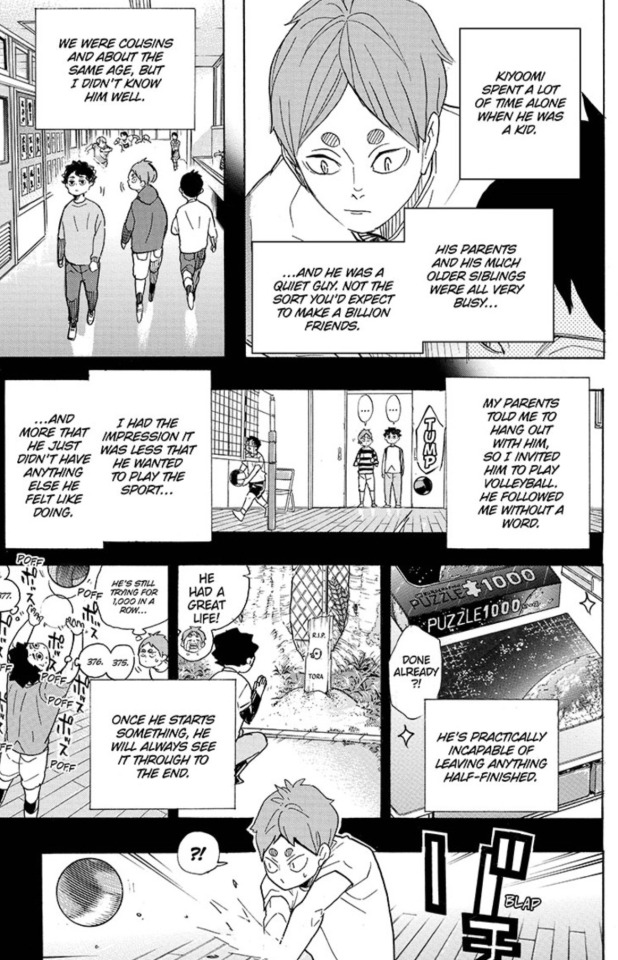
Also, if you wanted to know WHY Komori is so good at being a libero, look at this page below. I mean, if YOU had to practice non-stop with the Top Ace in the nation, receiving his spikes, you can only imagine that you’d be amazing at the sport.
I also like how this page points out how, despite Sakusa also having a physical trait that makes him stand out -- like Ushijima -- in contrast, it seems Sakusa’s “oddity” was instantly accepted among his peers and he didn’t face much resistance to it. Of course, this also could be because Komori notes Sakusa wasn’t close with his “much older” and “much busier” family.
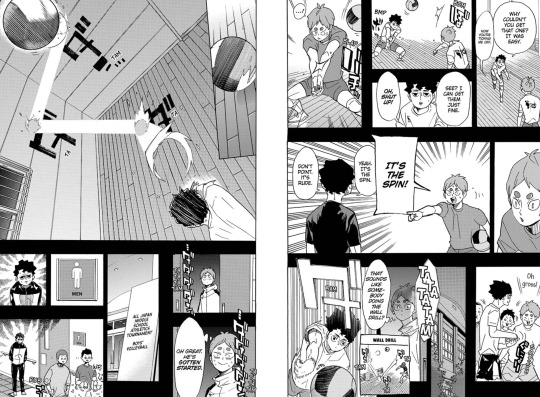
Tendo’s Friendship
And, tying this all together, of course, is Tendo’s involvement.
I love chapter 176 and this part of the anime, where we actually get backstory on Ushijima. I love that Tendo is pretty much his “true” friend in this series, as he actually is one of the few at Shiratorizawa to take the time to ask questions and get to know Ushijima.
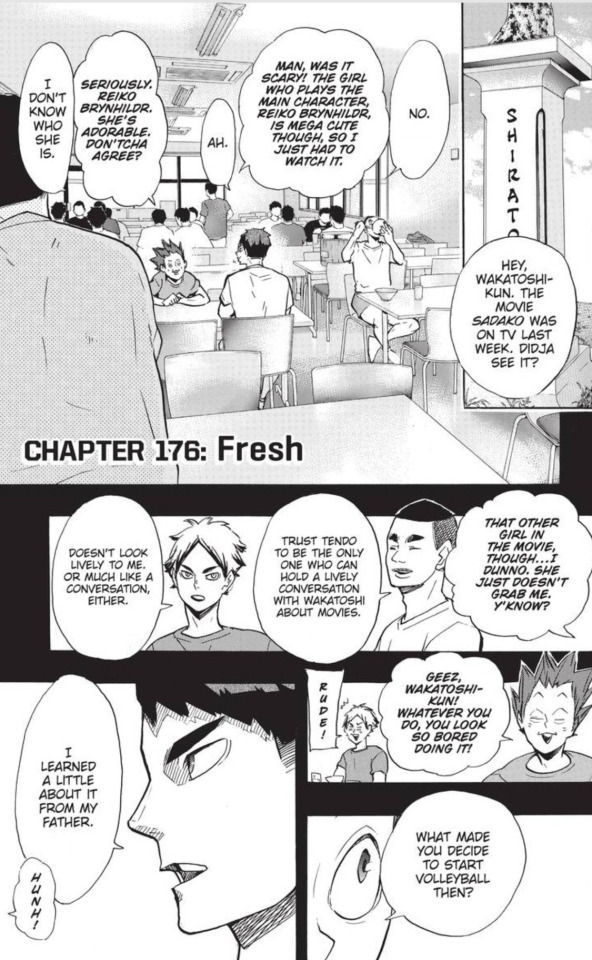
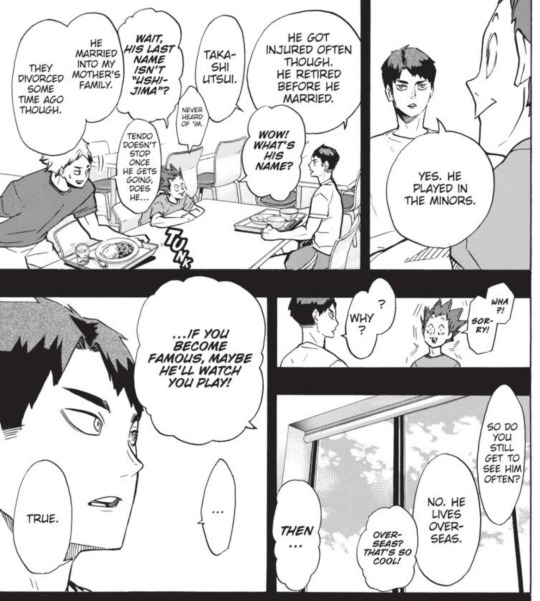
Chapter 176 is a big source of material for people shipping Tendo and Ushijima together, and I’ll be honest -- until Sakusa came into the picture, I was right there with you all. Tendo shows genuine concern and sincerity in his conversations with Ushijima off the court, and on the court, he’s practically the ONLY character on Shiratorizawa’s team, and in the whole manga (other than Oikawa) that calls Ushijima out and isn’t afraid to tease him.
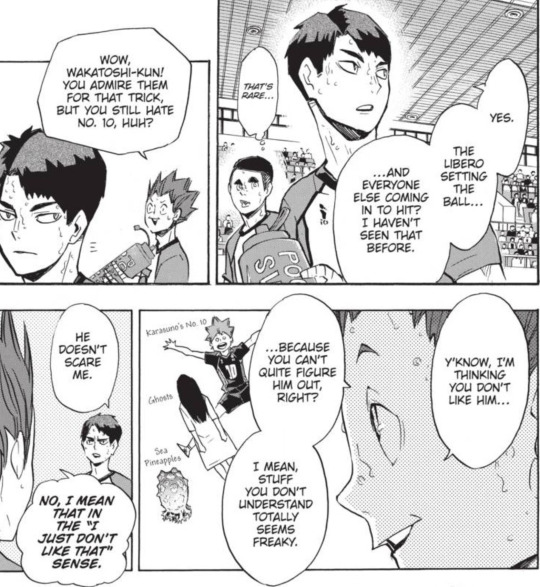
Of course, in the end, Tendo is just as impressed and in awe of Ushijima’s raw athletic talent. It’s likely this page that fuels a lot of the ship:
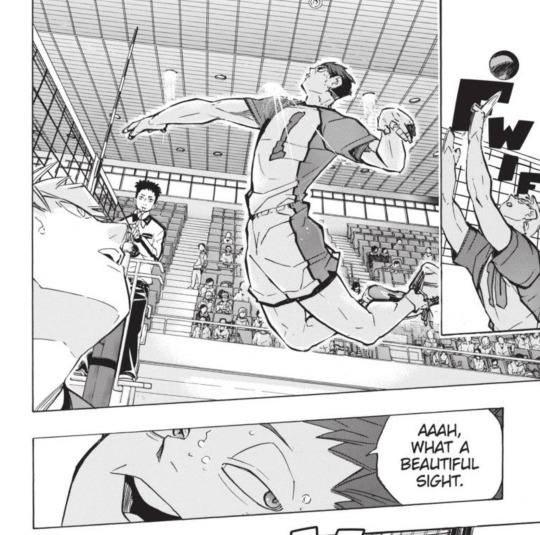
And, even later on, Ushijima borrows Tendo’s words to reveal to the team how much he’s enjoying the match, much to their surprise and Tendo’s delight.
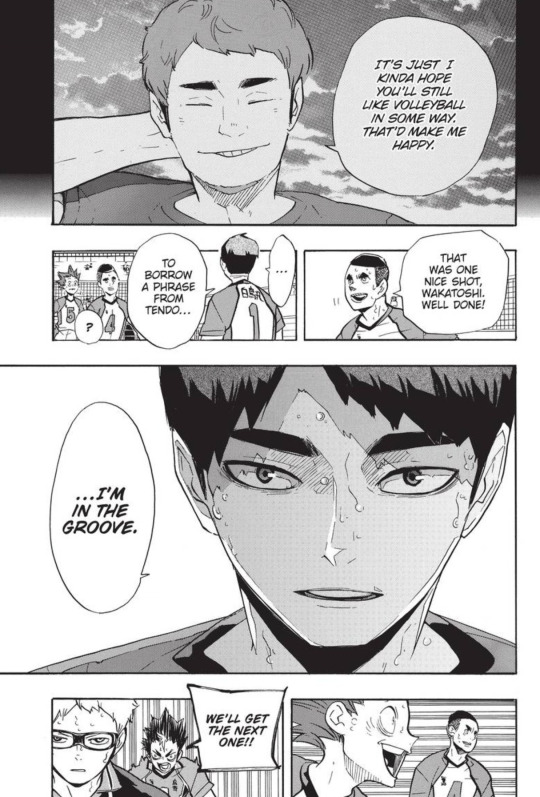
So yes, Chapter 176 I believe started the UshiTen ship, and it does become more compounded in the infamous “Boy Ball Arc” before Spring Nationals, as we learn in Chapter 210 about Tendo and Ushijima’s friendship off the court in more detail; one example being them sharing Shonen Jump magazines...
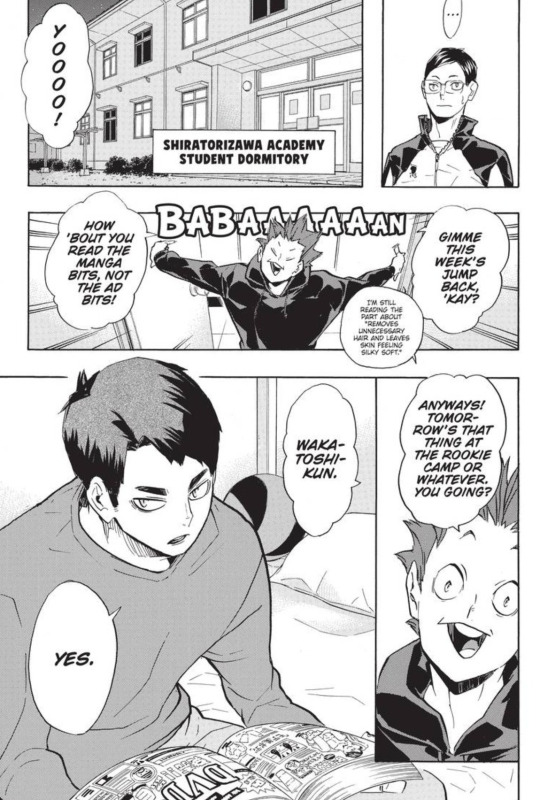
...and another being that they hang out during the practice matches, with Tendo being pretty much the only one talking to Ushijima in a casual setting.
I’d like to point out that while some see this in Chapter 214 below as a “ship” moment, I did start to question if the two were just friends when Tendo likens Ushijima to a “monster” like Hinata and Kageyama. To me, this banter reveals that Tendo, ironically referred to as a monster himself, doesn’t put himself in the same league or category as Ushijima. This is also reflected in how Tendo notes he’s not pursuing volleyball after high school, but hopes that Ushijima ends up becoming famous and interviews him as his best friend.
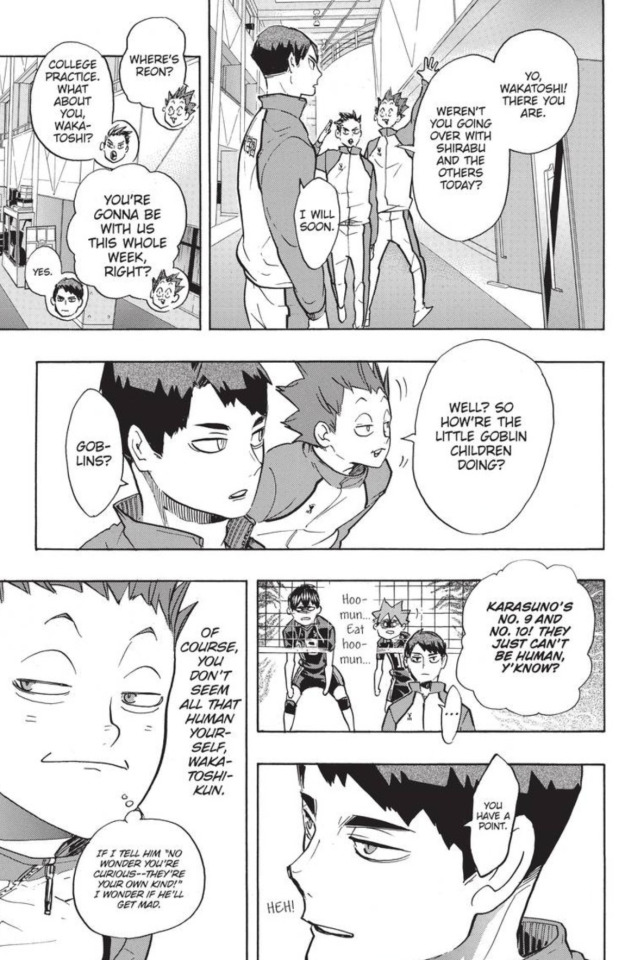
And this leads to the final point, which I think cements Tendo’s status as Ushijima’s best friend...but nothing more. Maybe. Perhaps. We’ll see.
We get the reveal in Chapter 395 that during Ushijima’s first few years post-high school, he didn’t constantly keep in contact with Tendo. We know this because Ushijima hasn’t mentioned his trip to the United States to Tendo, which had happened three months prior. So some time has passed there.
Of course, that doesn’t mean Tendo hasn’t kept caught up on Ushijima’s Pro Volleyball career, as that’s his reason for calling Ushijima in the first place.
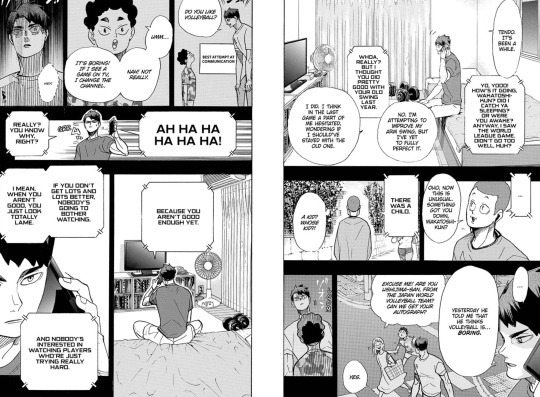
I like that Tendo offers Ushijima advice and genuinely asks how his family is doing, specifically his father, whom Ushijima went overseas to visit with his father. Even if it has been a while since they’ve talked, you can tell that they are close enough friends that everything seems to pick right back up where it left off for them, which is true for many real-life friendships, and I appreciate Furudate giving us that here, and expanded on more years later, below.
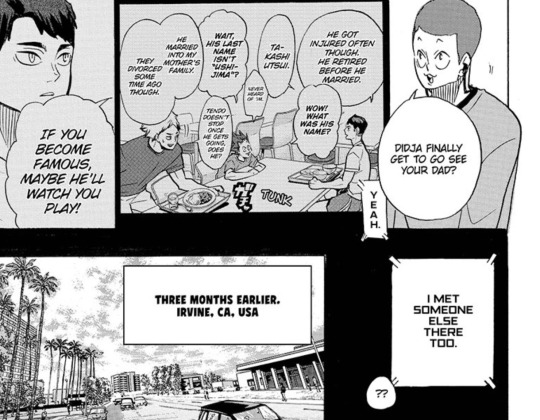
I love this page of Chapter 402. Especially Shiribu’s little crush of Ushijima, as he “shhh”’s Semi.
Not only because it reverses Tendo’s original prophecy that it would be himself interviewed as the famous Ushijima’s friend, but also that it cements their friendship. I mean, Ushijima flew to PARIS for the interview. I know that in itself could be considered shipper fodder, but the fact that they identify as best friends...it just fits them so well. And I could see Tendo talking with Ushijima on late night phone calls to talk him through his dating, or lack thereof, woes.
Also, let it be known these men are the most stylish in Haikyuu!! They should work with Asahi.
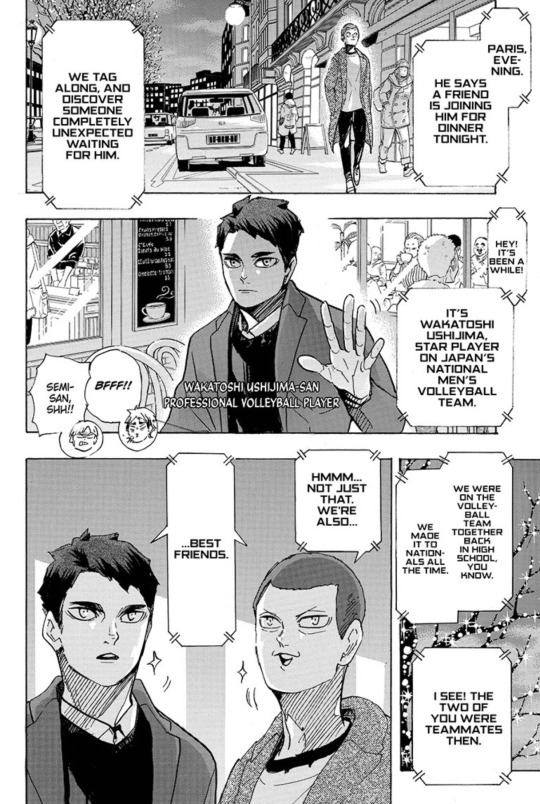
Also, also, Tendo’s favorite food is chocolate ice cream. That should have been all the foreshadowing we needed for his future career, right? ^^
Black Jackals vs Adlers
So, that leaves us with the meat of the UshiSaku ship: the Adlers vs Black Jackals match, and the final chapter 402. In Chapter 394, we establish Sakusa’s backstory and the potential pining he’s done for Ushijima the last ten years of his life, starting with this page:
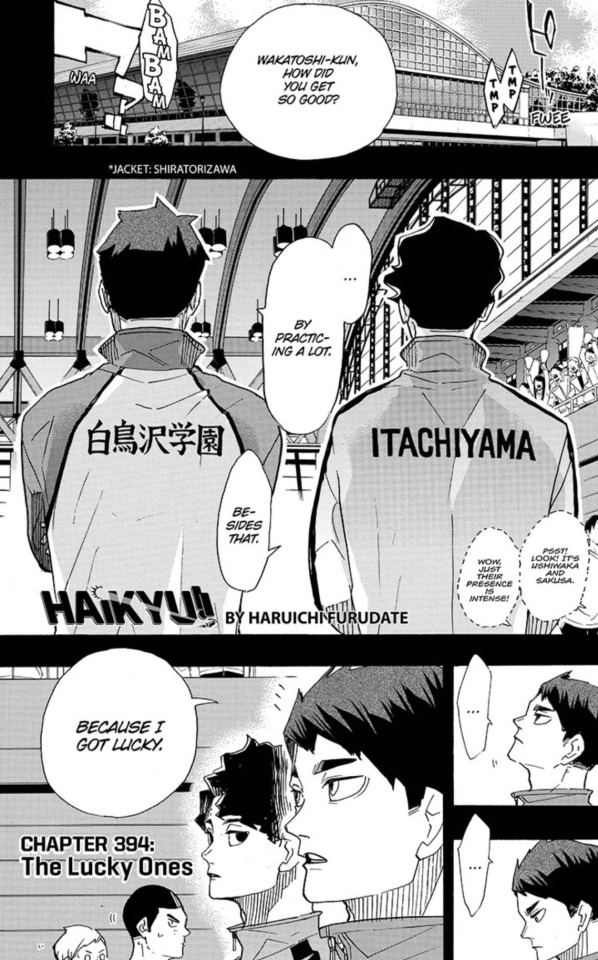
Again, tying back to being “lucky.” I like that despite how Ushijima couldn’t comprehend where Hinata attained all of his athleticism and lamented how half of his plays were just “lucky” and a combined effort of him and his teammates, in the end, Ushijima admits here that he himself is rather “lucky” he won the luck of the draw athletically and was born with a particular trait that made him excel in the game (that being lefthanded). Sakusa, incidentally, falls into the same category, though he doesn’t quite admit it as such.
I like that we see these two actually interacting side-by-side, as equals, a visual I think Furudate designs intentionally. Unlike Tendo, who doesn’t situation himself in the same realm as Ushijima, Sakusa positions himself right in the same sphere, of the “Monster Generation.”
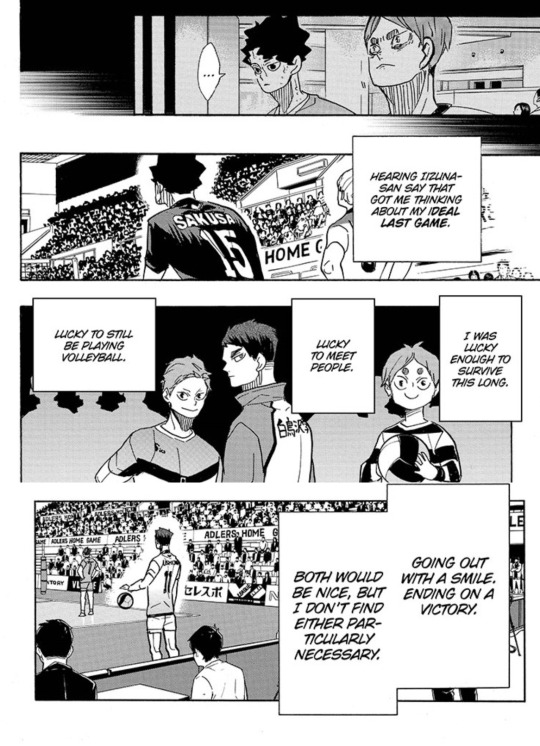
By the end of Chapter 394, Sakusa reflects on his own “luck.” In how he is lucky to have been given life -- reflected with a picture of Komori, his family -- to have met people -- reflected by Ushijima specifically -- and to still be playing volleyball -- reflected by his old high school setter, whom went on to play in the Division 1 league after his own injury. His views of “luck” are all represented in ideally, the people that mean most to him...and Ushijima is one of them.
Sakusa also describes his “Ideal Last Game,” which could be represented by the game being played in that moment. It’s beautiful that someone who is so germaphobic and hyper-obsessive with controlling the atmosphere around him (who he comes in contact with, how he finishes everything he starts), is also so content and at ease on a volleyball court, where nothing is in his control but his own body and the contact he makes with the ball. And it also helps that he’s surrounded by amazing players, like Ushijima, here, to keep him rising to the next challenge --
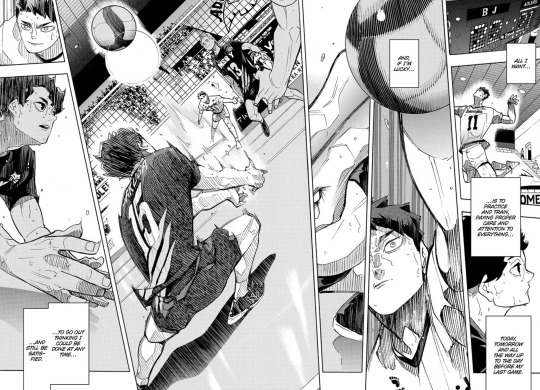
-- which ends up coming his way in the very next Chapter, as Ushijima (coincidentally right after Sakusa) has his “moment” of reflection and growth put on display. Of course, Sakusa isn’t “finished” with catching up to Ushijima yet, as his cousin snidely reminds him with a laugh, here. I love that we see Ushijima smile, though, at Sakusa’s effort.
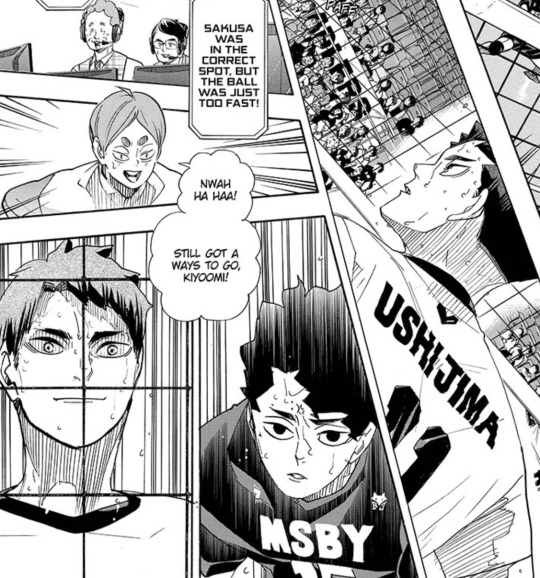
Speaking of “Effort,” that ties into later in Chapter 400, when we have Sakusa’s own high school banner for Itachiyama put on display. It’s a simple motto, that goes alongside Shiratorizawa’s in “Be Strong.” I also like here, that in contrast to Chapter 395, when Ushijima was smiling at Sakusa, who couldn’t bump his spike, in Chapter 400, we have Sakusa getting the spin off of Ushijima’s hand, and as he lands, he gives a little smirk to a disgruntled Ushijima.
LITERALLY, these two have only truly smiled during a game at each other. Sure, each have scowled and showed irritation and drive towards facing opponents, but have we seen them “smile” at another in the midst of a game? Not really, unless you count Sakusa getting that service ace before Atsumu Miya in this same game...
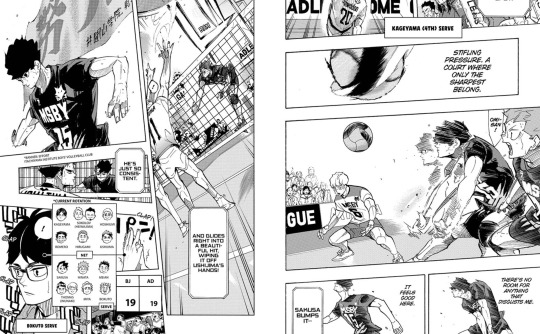
Speaking of Atsumu Miya, we’ll talk about him a little bit below. But for now, I like that Sakusa describes that there’s no “room for anything that disgusts me” on the court in a pro volleyball game. Everyone is at their fullest potential and peak physical condition, just like Sakusa, and they all have worked diligently to get to that position.
We don’t get much other UshiSaku crumbs post Chapter 400, although, I would like to point out that Furudate, when drawing the National Japan Olympic Team, placed these two right next to each other. You know...for no reason, I’m sure.
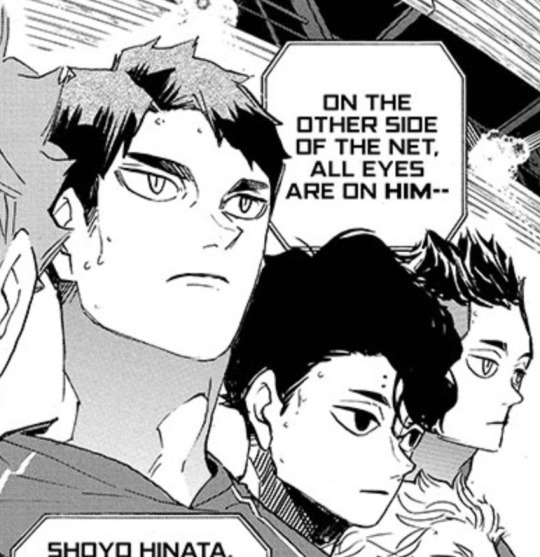
And yes, I would be remiss not to mention this tiny panel -- the last we see of Sakusa or Ushijima or Atsumu Miya, I believe -- as it’s Sakusa that digs up Oikawa’s insane serve. I just LOVE the smile that Ushijima has here as Sakusa digs it. Because unlike Sakusa and Atsumu Miya, Ushijima knows exactly what kind of player Oikawa was in the past, and no doubt knows the kind of plays he could pull off...so I’d imagine he’s proud that his teammate dug up this serve right off the bat.
I know there are a lot of people that ship AtsuSaku, and I won’t deny you that Furudate has laid out crumbs for them as well...but I sort of view Miya with Sakusa the same way I view Tendo with Ushijima at the end of the day: as best friends. I definitely think that there is a hilarious friendship angle with Sakusa and Atsumu Miya -- but I think it’s Ushijima that is the player Sakusa is always going to try and beat and surpass...you could argue, very similar to the dynamic between Hinata and Kageyama in their rivalry...albeit, I think Sakusa’s hints more deliberately at something more...but that’s just my opinion.
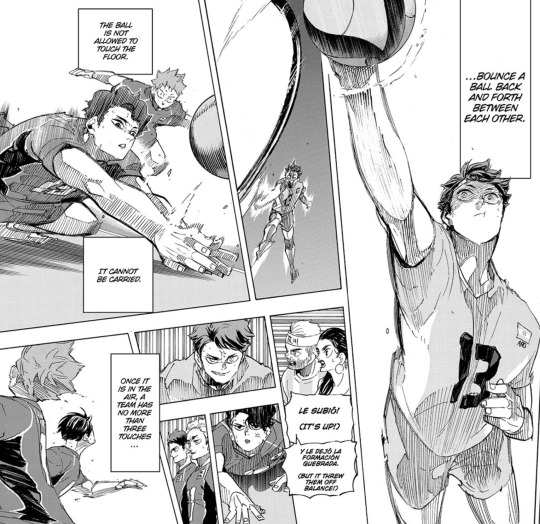
In the end, I find it interesting the decisions Furudate makes to show us these characters and specific interactions at the end of the series; specifically, showing Ushijima and Sakusa’s backstories back-to-back, and with all the little glances and panels of them near or looking towards one another. But hey, shippers will see what shippers want to see, right?
I do think that Komori’s panel here in Chapter 394 is pretty telling, though:
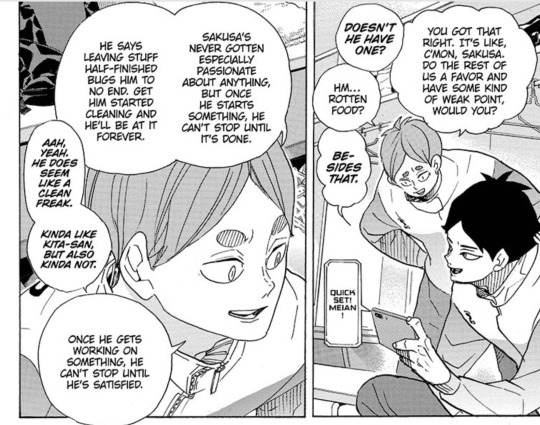
Sakusa has identified Ushijima as someone he wants to beat and surpass, and he’s not going to stop until he does. And if there are feelings beyond that...well...he’s not going to stop until “he’s satisfied” with that, either.
At least, according to Chapter 378, Ushijima’s already got his flu shot.
I hope you all enjoyed this little dive into this bizarre pairing in Haikyuu!! I’ve wanted to break this apart for a while, and now that the manga is over, I hope to do more of these types of posts with other pairings. Until next time, we can celebrate the ship that is UshiSaku (and KomoYama/KageMori -- pass it on!) with fan fiction and fan art to our heart’s content! ^^
#Haikyuu!!#Haikyuu!! Spoilers#Haikyuu observations#UshiSaku#Ushijima x Sakusa#Ushijima#Sakusa#Tendo#Ushijima and Tendo#Atsumu Miya#Motoya Komori#Komori x Kageyama#Tobio Kageyama#Shoyo Hinata#Haikyuu 402#Haikyuu 400#Haikyuu 394#Haikyuu 395#Haikyuu 210#Haikyuu 206#Haikyuu 176#Haikyuu 179#Haikyuu 155#Haikyuu 378#Haikyuu time skip#Haikyuu ships#Rhetorical Ink#oikawa torū
111 notes
·
View notes
Note
Bnha is a little too irregular for me right now (covid is the worst :( ), so I started reading One Piece and it's like, soooo long. Got me thinking, how long do you think Bnha will be? Personally I think we're just before time skip and it will take, like 300-400 chapters to end? So manga would be 600-700 chapters long. I could be wrong of course. Thoughts?
One Piece is fucking awesome, and the beauty of it is that is is 12 million chapters long so it will take approximately 182 years to finish reading, and you are almost guaranteed to be entertained for the vast majority of that time lol. I actually took a break from it a little ways into the Wano arc (sometime in the middle of what would later become volume 92) because it was getting harder for me to keep up with the plot week by week, especially since I was really into BnHA fandom by that time. my plan was to binge it once Wano ends. however when I was looking at the list of chapters on Wikipedia just now I saw that Oda is only 11 chapters away from breaking the 1k mark, which is pretty awesome. so I might try to catch up in the next month or two in celebration of that milestone, because damn.
with BnHA though, my own guess for how long the series will be is actually a lot shorter than most estimates I’ve seen. first of all, full disclosure that I am definitely biased regarding the timeskip part, because I personally am not the biggest fan of BnHA timeskip theories, unless they’re really short timeskips like the 3-month one we got recently. the thing is, this is explicitly a manga about their time at UA. it’s in the title and everything lol. and I like that. I like reading about them as kids, little hero eggs gradually growing into little hero chicks who will eventually become big hero birbs, but not just yet. a lot of the story’s appeal for me comes from that. there’s a certain... I don’t necessarily want to say innocence, but idealism, maybe?, that’s associated with stories about young adults, and doesn’t always carry over into the stories about those same adults once they’ve grown up. and I want the story to keep that.
there are a lot of things about the current setting that I’m very attached to and don’t want to lose. I like that they’re kids, and that they’re full of potential but don’t always know what they’re doing, and they screw up and make mistakes and get in over their heads, and are dealing with all of their messy jumbled teenage emotions. I like that they’re living with each other in the fanfic dorms and seeing each other every day in their classes. I like that romance isn’t a big part of the series (though there’s still plenty of shipping fuel to go around). I like that we get to see them interacting with their parents and siblings and get to see those relationships. and most of all, I like that -- unlike almost every other young adult series I can think of -- BnHA acknowledges that they are just kids, and the adults by and large actually treat them as such. and yes, I’m even including the child soldiers arc here, because the decision to basically draft them into a war was handed down by the HPSC (an organization that likely has a history with child abuse from what we’ve seen). U.A. was against it, and tried their best to keep them away from the front lines, chilling out in the woods and helping with evacuations instead of fighting villains. contrast this with, say, a:tla, which I love, but which is very much one of those series filled with full-grown adults who are all “it’s up to this 12-year-old and his assorted 12-to-15-year-old friends to lead the battle to save the world lulz.” and this includes possibly the most beloved full-grown adult of all time, who nonetheless peaces out with an ironclad argument of “while it is true that the final villain is my actual brother, I’m still going to let the 12-year-old handle it because something something politics slash destiny.”
but anyways lol got sidetracked there. so steering this back on course now, I genuinely, truly love that in BnHA there are all these adults in the characters’ lives who are trying to keep them safe and nurture them and shield them from that extra burden of responsibility for as long as possible while they’re still learning. and so the kids have that extra safety net of support, which to me as a reader is just... comforting, I guess. like, I understand that it’s not going to last forever, but it’s reassuring to know that it exists for them for now. and I’m not in any hurry to say goodbye to that in favor of just tossing them out into tHE REAL WORLD!! lol. like omg no my babies.
anyway but so the point is that, with respect to everyone else’s theories, I personally don’t want a timeskip lol. and tbh I don’t really see the need for one either? if anything, we’re about to enter the most chaotic period in the entire manga once this arc ends. I’m assuming Tomura will survive this and escape somehow, the better to live and fight another day. and so if that’s the case, I feel like this would be the absolute weirdest time to do a timeskip, because how far ahead can we even jump lol. too far and we’d basically be coming back to an already-destroyed world lol whoops. basically I just don’t see how we can jump ahead more than a few months at the most, assuming that the threat of Tomura is going to be looming over everyone’s heads the entire time. plus we’d miss out on what I’m betting is going to be some of the most intense worldbuilding drama in the entire series, with our beloved characters potentially being swept up in like half a dozen political controversies. I sure don’t want to miss out on any of that. we didn’t wait so long to see this war play out only to skip out on the highly entertaining aftermath of it all.
anyway so that’s my as-usual-longer-than-necessary rant about timeskips. so now let’s talk about the series length. and here, I’m basically just basing my guess off of what Horikoshi has said in interviews. off the top of my head, there are three times he’s mentioned the ending of the series in interviews. first, there’s this interview, published in July 2018:
Interviewer: Previously in SUGOI JAPAN*, you mentioned that you would like Boku No Hero Academia to be a short and concise story and not drawn out, but what percentage of the story is complete at this point?
Horikoshi: When the decision to extend the series happened, I personally thought “I guess I want to end it here” and it was around Volume 30.
Interviewer: So then are you 2/3 done with the story?
Horikoshi: That’s what I had originally planned, but when I think of all the things that must be set up before getting into the last arc, I realized, “Ending the series at Volume 30 will be impossible” (laughs). However, the current arc that is going on all has purpose that will be relevant in the last arc.
*this is referencing a remark he made back at an awards ceremony back in March 2017.
second, we have this interview from August 2018, where he again mentions wanting to keep the story concise:
Do you know what the ending of My Hero Academia is? Do you think it'll be 80+ volumes like One Piece?
No, it won't be infinite – I don't have the stamina for it to be as long as One Piece. I'd like to keep it concise.
and lastly, this one which was published in December 2019:
What can you say about the future events of the manga?
I’m conscious of the end of the series, and writing towards that. I think the story will always be moving in big ways going forwards. My Hero Academia has a lot of characters, a lot of characters doing different things with different motivations, and the story is heading towards a conclusion where all of that comes together and heads towards the end.
my takeaways from these interviews are that (1) he originally planned for the story to be about 300 chapters long, (2) he’s had a clear idea of his overall endgame for a while now and has been steadily working towards that (as he put it in another interview, he knows all of the dots, but is still figuring out the lines to connect them all), and (3) he specifically said a couple years back that he did not want to write a long One Piece-length series, and his goal was to write a more concise story than that. Horikoshi’s pacing has always been much faster than Oda’s (or Kishimoto’s, or Kubo’s, etc.), and so I think it’s a realistic goal for him to wind up with a significantly shorter story in comparison.
my best guess is that BnHA won’t be much longer than 400 chapters, or a little over 40 volumes. he said back around chapter 180-something that he was nowhere close to being two-thirds of the way done. but it’s been two years since then, and if we haven’t reached at least the two-thirds mark by this point, I would honestly be very surprised. it would mean we’ve barely made any progress at all, and I don’t know about you, but the past few arcs have felt very purpose-driven to me. I think he has a pretty good idea of where he’s heading at this point, and that to me supports the idea of a shorter story than a lot of people have speculated. mind you, he might end up doing a sequel or something afterwards (although I kind of cringe thinking about all the ways we’ve seen that kind of thing go wrong in the past, ngl).
but as far as the series proper, yeah, I’d say 400 chapters is my best guess. ultimately I just hope he’s able to tell the story he wants to tell and gets as much time as he needs to do so, without feeling any pressure to then drag it on past that. knowing when to end your series is so underrated honestly. I have my fingers crossed that it’s a skill Horikoshi hopefully possesses.
#bnha#boku no hero academia#bnha meta#bnha spoilers#mha spoilers#makeste reads bnha#asks#long post#knowing when to end your posts is another underrated skill#which I do not possess lmao#bnha endgame
58 notes
·
View notes
Note
Hi! I see that you appreciate ADAM’s characterization, so I wanted to talk to you about my theories for how the series could end for him if that’s okay.
Obviously there’s the semi-dropped plot line around him going to jail for political reasons. Tbh I hope that they’ll just bring that up at the very end of the tournament/ep 12 so that it doesn’t have much bearing on the characters developments until then.
My best scenario, is that Reki does skate against ADAM because he’s surpassed his own fears to have fun. Like the first time where he wasn’t afraid to lose because it was more about trying.
But now that Renga has reunited, the tournament isn’t nearly as exciting for ADAM because the friend group is over his antics and Langa doesn’t particularly care about him anymore. (I totally think Reki represents the Apple in all of this biblical reference stuff. Wisdom that love and fun cannot be gained simply by being the best or being dangerous when skating. Especially since Tadashi [SNAKE] is literally bringing him into the Eden tournament)
That would leave Langa and Tadashi. I honestly think that if a fair match between them goes on without any interruptions, SNAKE can win. Then with the final matchup between Tadashi and Ainosuke, it can go 2 ways.
1. Tadashi tries to take ADAM down. He fails or succeeds solely on technique. Either way probably ends in a dramatic end to S.
2. Tadashi also recognizes the value of love and fun that he has rejected/suppressed all these years. He is able to better understand the root of ADAM’s searching for an Eve (filling Tadashi’s void) and why Ainosuke is so hurt by him/angry at him (Tadashi pulling away from their relationship). Reki planted the seed in the love hotel, and if Tadashi accepts it, his participation becomes more about embracing love that was squashed years ago when he prioritized Ainosuke’s image over their relationship. Tadashi sees his value outside of his class standing as a person and companion. He stands up for Ainosuke instead of against him, and they can skate/move forward together.
I think that the 2nd option is far more interesting and gratifying. Especially since it’s more likely to lead to ADAM recognizing the flaws in his way and turning towards redemption/help by the end of the season. It would also be a really good ending to their arcs together since I really think that they’ve been set up as a queer allegory. I’ve read super interesting analyses on Twitter that show their character choices as being two different ways of coping with being closeted. Ainosuke lusting dangerously after those he doesn’t really care about and acting out violently against those who love him. Distracting himself the feelings he is not allowed to deal with in daylight. And Tadashi repressing his feeelings for the sake of the man most important to him. To have a hopeful/positive conclusion to their struggles as a central plot line would be nice.
Also don’t feel pressured to answer this. I’m just obsessed with their stories and a sucker for first loves + requited mutual unrequited pining lol
Heyyyy fellow non-Adam-hater!
I do think that Reki will end up skating against Adam (though I currently can’t imagine why he would possibly agree to do so--the best guess I have is Tadashi asking him to based on the argument of “skating should be fun” and that Adam isn’t having fun), getting fucked with since Adam wants to prove to Langa that he’s better than Reki (because Adam doesn’t understand that “love” doesn’t work that way, since his “love” is all about finding someone who can skate on his level), and losing, but without getting depressed (and possibly injured) like before.
I know there’s a huge fandom wish that Tadashi will train Reki and Reki will beat Adam, but... if the producers are going to be somewhat “realistic,” that’s not going to happen. It’s been firmly established that Reki isn’t on the level of the top skaters (both his own realization and his talk with his manager), and a sudden crash course in a day or two isn’t going to change that.
But I do think that Adam will still have fun during the tournament since he’s wildly delusional and thinks that he can win Langa’s “love,” and for the longest time, it did appear that way (“love” in terms of thinking of it as looking for/finding a skating equal, not “love” as in love), with how eager/excited Langa was to skate against him, to the extent that it even fractured his relationship with Reki (though I blame Reki more for that).
I feel like the Langa/Tadashi match is more of a tossup. I’d like Tadashi to win, but I believe that Langa will (unless he gets outraged by Reki’s treatment and forfeits/abandons the race--tasting the forbidden fruit and leaving Eden). If it was a straight skating race, then, yeah, Tadashi would win, but I think that Langa’s spontaneous improvisations will turn it in his favor even though he lacks Tadashi’s level of skill. I mean, he can cut across half the course by going off the cliff at high speed, so..... *laughs*
If it did come down to Adam/Tadashi, though, I feel like Adam wouldn’t be motivated, just like when he was racing Cherry. He wouldn’t do rough play or hit Tadashi in the face with his skateboard because they wouldn’t work on Tadashi, and he would be trying to win since winning races is how he proves that he loves skating more than anyone else (and also because if he loses, he has to quit skating). But I don’t think he’d enjoy it. I would love for them to have a reconciliation and for Tadashi to become Adam’s “Eve,” but I feel like that bridge has been well and truly burnt by years of misunderstandings/resentment (resentment from Adam to Tadashi, but not the other way around). I don’t see how a realistic full reconciliation can be made in one episode (though the groundwork for a reconciliation could possibly be laid). :(
The queer allegory is really interesting and definitely fits. Especially since Adam has been raised to always consider his appearance and how it’ll affect his family, and physically abused when he doesn’t meet expectations. And then he also admits that the only time he’s free is when he’s skating, which is when he’s openly proclaiming his love for just about everyone, lol.
Though if Reki is the apple/forbidden fruit (which I do agree), I think that means that Reki is the one who’s going to spark a change in Adam, not Tadashi. By not giving up and still having fun even when he’s losing or being thrown around by a violent psychopath, it could remind Adam of when he was younger, when he was skating with Tadashi and just having fun (or possibly serve as a parallel to when he got his board burned). If it does turn out that way, then I can see a path for Tadashi being his final opponent to bring both of them back to that time. Though I still feel like the final race will end up being Adam/Langa since that’s what the show has been driving towards ever since their first race was interrupted.
Adam’s arrest will definitely come at the end of the show, though. I don’t see the producers leaving the main plot line without a conclusion before they tie up the subplot which has basically only appeared once, lol.
So yeah, I absolutely realize I’m being self-contradictory in this post, but that’s why I’m fantastic-rambles. I just spew whatever bs and random thoughts come to my mind. xD
#sk8#sk8 the infinity#skate the infinity#sk8 adam#shindo ainosuke#ainosuke shindo#sk8 snake#kikuchi tadashi#tadashi kikuchi#sk8 snow#sk8 langa#hasegawa langa#langa hasegawa#sk8 reki#kyan reki#reki kyan#analysis#long post#mine
11 notes
·
View notes
Note
Hope you're having an amazing day! If you have the time, I was having trouble deciding between a Knight of Light and a Sylph of Light. See, the character is doing an obsessive amount of research in an attempt to fix what they think is wrong with their world. They are quiet about it, work with others, and are kind of like the team leader while others are in the spotlight. So they are like a protector/healer. If you have any ideas about what classpect would fit best, I'd appreciate it. Thanks!
Sorry it's been so long since I've been on here! Life has been crazy, between the pandemic, trying to find a new job, and finally approaching my top surgery in just a week! So, I'm about to have a boatload of free time on my hands, and I'm hoping to get back into this analysis gig, because I genuinely really enjoy it.
Let's start by briefly describing both the Knight and Sylph of Light to give you a better background on each. Since you know more about this character than I do, there may be qualities you see in one description that causes you to lean one way or the other. The main thing to remember—and this is a trap even I fall into from time to time—is that there's no set personality for any given Classpect, regardless of what some will tell you. All a Classpect does is define the whats and hows of your effect on the universe. It describes your toolkit, as well as a general purpose. With that said, let's first describe the Knight.
Knights are extremely good at exploiting their Aspect, and generally it benefits their team when they do so. There's a lot of debate over whether Knights are Passive or Active, and the more analysis I do, the more they seem Passive compared to the Page, whose entire arc demands that they become self-sufficient and independent, regardless of how they begin. The Knight of Light exploits things like fortune and information. They also weaponize these things with brutal efficiency. An excellent example of a Knight of Light is the child genius Bean from Ender's Game and, more importantly, Ender's Shadow. In the latter, we get a glimpse into his mind, and we see he's extremely skilled at using one tiny scrap of information to "snowball" his way into incredibly accurate predictions about the world. For a Knight of Light who focuses on research, if you give them a millimeter, they'll stretch it for a mile.
Sylphs, like Knights, are also a Passive Class. They're typically described as "healers" of their Aspect, and fortunately we have an excellent Sylph of Light in Homestuck canon to draw inspiration from: Aranea Serket. Aranea's self-described role is that of a storyteller, "healing" the gaps of information present in any given situation. She takes this job very seriously—to a fault, I might add, though one could certainly say the same about me. Since Sylphs provide such a vital role in the team composition, they're often valued members of the team, at least in terms of their Classpect abilities, and a Sylph of Light would likely be no different, capable of turning around a streak of bad luck, provide a teammate with the information they need to move forward, or even healing someone's sight, as Aranea did with Terezi. It's all up to the individual Sylph.
With each summary out of the way, let's take a look at the character you've described. Both Classes could easily fit, so I definitely see what's gotten you stuck between them! What really counts, in this case, is their motivation. A Sylph, by nature, is far more likely to have a goal like "fixing the world" because they tend to be extremely sensitive to systems, environments, or even people that they see as fundamentally broken. While a Knight would certainly take note of these things, only a Sylph would feel the strong pull to change things for the sake of fixing them, whereas the Knight is more than likely going to use the knowledge of such brokenness—and their further interpretations—to help themselves and their team navigate those systems and whatnot. To the Knight, understanding the intricacies of how screwed up the American education system is would be enough. They can work with that information and use it to achieve success for themselves and others through exploiting that broken system. A Sylph, however, would feel compelled to fix the system itself, and their obsessive gathering of pertinent knowledge would be an important step in that process, as well as a reflection of their nature as a Sylph of Light in particular.
With all that being said, I think the Sylph of Light is an excellent fit for the character you've described! I hope this helps! It's great to be able to flex my creative muscles again.
#classpect#classpect analysis#classpecting#homestuck#sylph#light#sylph of light#anon#i'm back baby!#homestuck analysis#knight#knight of light
5 notes
·
View notes
Text
So there was this thread I wanted to write since I saw bnha288 leaks, and I told myself I wouldn't get back to social media until I finished writing it...
Turns out I'm really really slow at writing, and could manage just to get half of it done 💔
Anyway, I thought it'd be better to post half of it than nothing, since the chapter will come out this week anyway 😅
So here's the half I got done, I hope you like it 🤗
I can't talk enough about how much I loved bnha288. Not just because it gave us some badass Ochako moments we've been waiting since this arc began, and the fact that part of it is her rematch with Toga Himiko is absolutely perfect, but also how this very fight can help develop how Uraraka sees hero society and, more importantly, how this will develop her character even more.
But first, let's discuss what might happen on #bnha289:
IMO there are basically three ways this fight is gonna go down:
• Someone is gonna interrupt them;
• Toga wins;
• Ochako wins.
First of all, I do not like the first one. This is the rematch most of us have been waiting for the most (yes, more than a Deku x Bakugou rematch). It's their moment, with no one to be in their way.
About the last two, first thing to say is that I had a feeling that Mr Compress' marble was totally a chekhov's gun as soon as I saw it, and I'm completely sure that the winner is gonna use it to capture the loser.
Now the second one (Toga wins) is... complicated, to say the least.
Someone might say "I wanna Toga to capture Ochako so she'll have another great rescue arc like Bakugou had". Well... yes, but actually no.
You see, the LOV captured Bakugou for a very specific reason. They wanted that very arrogant and explosive boy, with in their eyes very much potential to become a villian, to turn sides an joint them. But that wasn't what happened. In fact, that arc, and his spare against Midoriya that came after that just how much he wants to be a hero, despite of this very flawed personality.
That rescuing arc not only showed us how the other characters felt about that, but most importantly it showed us how Bakugou really is: he will never become a villian. He had always been a power hunger person, always aiming for being stronger, but he wants to do it all while being a hero. He's not willing to change sides just for power.
Now getting back to Ochako, I ask you: if she lost and was captured by Toga, what would this tell us about both of them?
First, it'd establish that Toga is a sadistic sociopath that wants to keep Ochako for herself because she's obsessed with her. And, well, we already know that. And if that happened, I don't believe Toga would tell the LOV she has Ochako literally in her hands, becuase unlike what happened with Bakugou, they have no intention on turning Ochako to their side, and Toga knows that keeping a hero as a hostage just for fun would cause trouble to the League. I'd be a rather meaningless capture, just to traumatise Ochako to hating Toga and the LOV even more.
Second, it'd establish that Ochako is weak and unskilled, wich is not true. Ochako has been a hero in training for almost a year, and Toga is just a regular girl that joined the LOV few months ago. And think about it: On their first fight, even when Toga was pinned down, she was able to destabilize Ochako just buy calling out her crush and telling her they were alike. Now at the very last page of chapter 288 we have the exact opposite thing happening: Toga is pinning Ochako down, and Ochako's is completly ignoring what Toga is saying so she can focus on her mission. Wouldn't it be very disappointing if Ochako lost again, showing us that she didn't actually made that much progress in her physical, mental and emotional skills since their last fight?
Now I think it's gonna be way more interesting if Ochako wins. Because despite defeating the villain, she won't feel happy nor proud about it. Instead, she might feel confused, wondering if the hero's side is in fact the "good side" of this war.
No, this is not a "Ochako becomes a traitor" theory. She still wants to be a hero, she still wants to go to UA, but now something is bothering her.
That's how I picture chapter 289 in my head:
They're gonna fight, and it's gonna be so badass.
Toga will get to hurt Ochako, scratching her face, her arm or something, but then Ochako manages to steal away Toga's knife and pin her down. Toga is totally trapped, there's nothing more she can do, and Ochako is holding that knife, pointing it at her...
Toga: so, heroine... Are you going to kill me? Are you going to kill me, just like you "heros" did with Jin?
Ochako: Jin? Who's Jin?
Toga: See??? You don't even know his name! So he wasn't a real person to you, right? So you could save him too? Why did you have to kill him!?
Ochako is devastated. She knows they are the villains, she knows they are just getting what they deserve. But here is Toga... not just that random villian that had attacked her, but a girl like her, a girl just her age, crying over the death of a dear friend...
Toga: You call us the villains, but you are even worse!
Toga is very good at disguising her self for deceiving others, just like she did with her a very few minutes ago. She needs to be great at acting and lying to succeed. But right now... Ochako knows she's not faking it. She's genuinely sad.
Ochako: No... I'm not gonna kill you...
She drops the knife in the ground beside them and reveals she has a tiny shiny green ball in her hands.
Ochako: But I can't let you go either.
She then uses that marble to trap Toga.
Ochako watches the girl vanishing in front of her eyes in mere seconds.
"Toga-chan... I'm... I'm sorry... I can't save you right now..." Ochako can see a very little version of Toga inside the marble. She hugs it with her hands and cries quietly.
She spends very few seconds crying. She knows she must get back to their mission. Ochako puts it in her uniform and... her pocket is already filled with something.
Oh, right, that little All Might keychain she was gifted on their Christmass party.
She looks at both of them: the keychain in one hand and the marble in the other one. The hero and the villain, the good and the evil...
Ochako is way too confused right now. But she cannot think about all of that right now. She wipes away her tears and run back to Tsuyu. End of the chapter.
I know I'm probably wrong on my headcanons because I'm not a good writer like Horikoshi is, and I know he and his team already wrote a very great chapter, that I'm for sure gonna love and brag about. But, even so, I do really like this headcanon of mine.
What's the core of Ochako's character? She wants to be a hero because she always wanted to help people. She's also happy and lively girl that likes to cheer everyone up, especially their friends.
We can see how she and Iida literally adopted little introverted Izuku and they became a best friends trio. We see she also became Tsuyu best friend, a girl that's also a little reserved.
At first, she wanted to be a hero basically for the job. And yet, not just for the money, but for helping her parents to have a easier life.
She also realised that helping people also includes not getting in anyones way. She thought a relationship would only disturb hers and Deku's focus on being heroes. So she ignored her crush on him, while using these same feelings as a thrust to keeping moving forward.
(and even if my shipper side felt sad when I first watched this, I have to admit this was a great mature decision of her, and the story wouldn't be as good as it is if she had confessed to him that time. It's great that Kohei is giving time for both their relationship and for their character development)
On the Overhaul arc, right after Sir. Night Eye died in her hands, her motivation developed to "I want to help people" to "I want to save people". Now she was 100% sure about what kind of hero she wanted to be: she wanted to be a rescue hero.
When she saved Deku from Black Whip, she asked herself: "of heroes save others, than who's gonna save them when they need it?". This is a very important moment, because while we know who she's talking about right now, she is still subconsciously thinking furtherly: "who's gonna save the people we usually forget to save?"
And now we're watching her making probably one of the most important steps of her development: "Who's gonna save the villains? If we are heroes, why are we killing them, defeating them, when they're just humans like us that need to be saved?"
Ochako is not the traitor and she never will be. She's still mad at Toga and at the villains. She knows that this danm war is their fault. She just wants it to end as soon as possible, and to everyone to be safe and sound. She's sure that the villains side is the worst thing ever, just as bad as it ever could be. But the point is: why isn't the heroes side as good and perfect as it should be?
----------------------------------------------------------
I wanted to make a part two talking about how Ochako will eventually help Izuku realize that the hero society is not as perfect as he think it is, and how this would be great character development for him. Maybe I'll finish writing it someday 😆😌
Thank you so much for reading this tread. I really hope you like it. Please feel free to comment sharing your opinions on what you agree and disagree about all of this, I'm highly open for your reviews on my thoughts 💗
24 notes
·
View notes